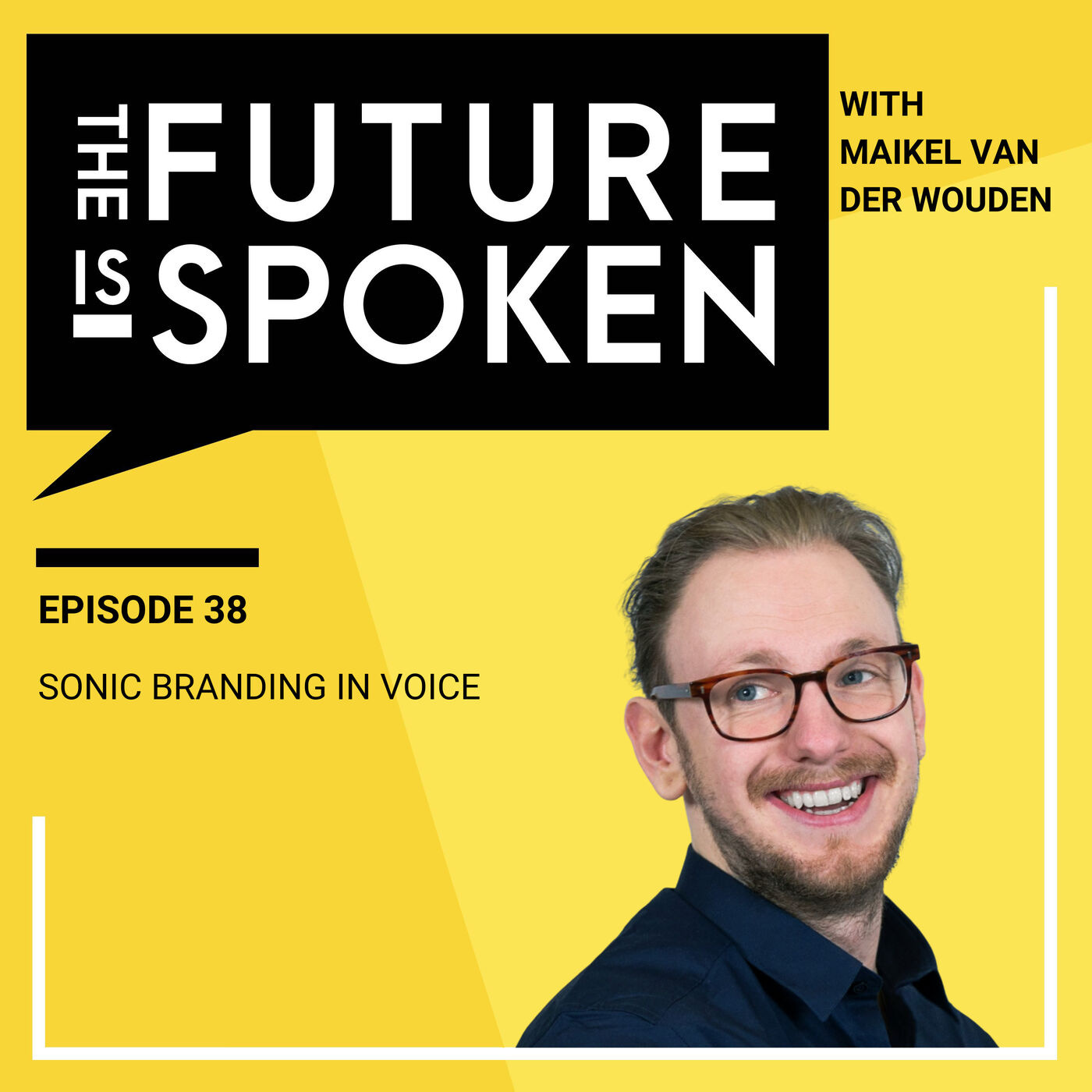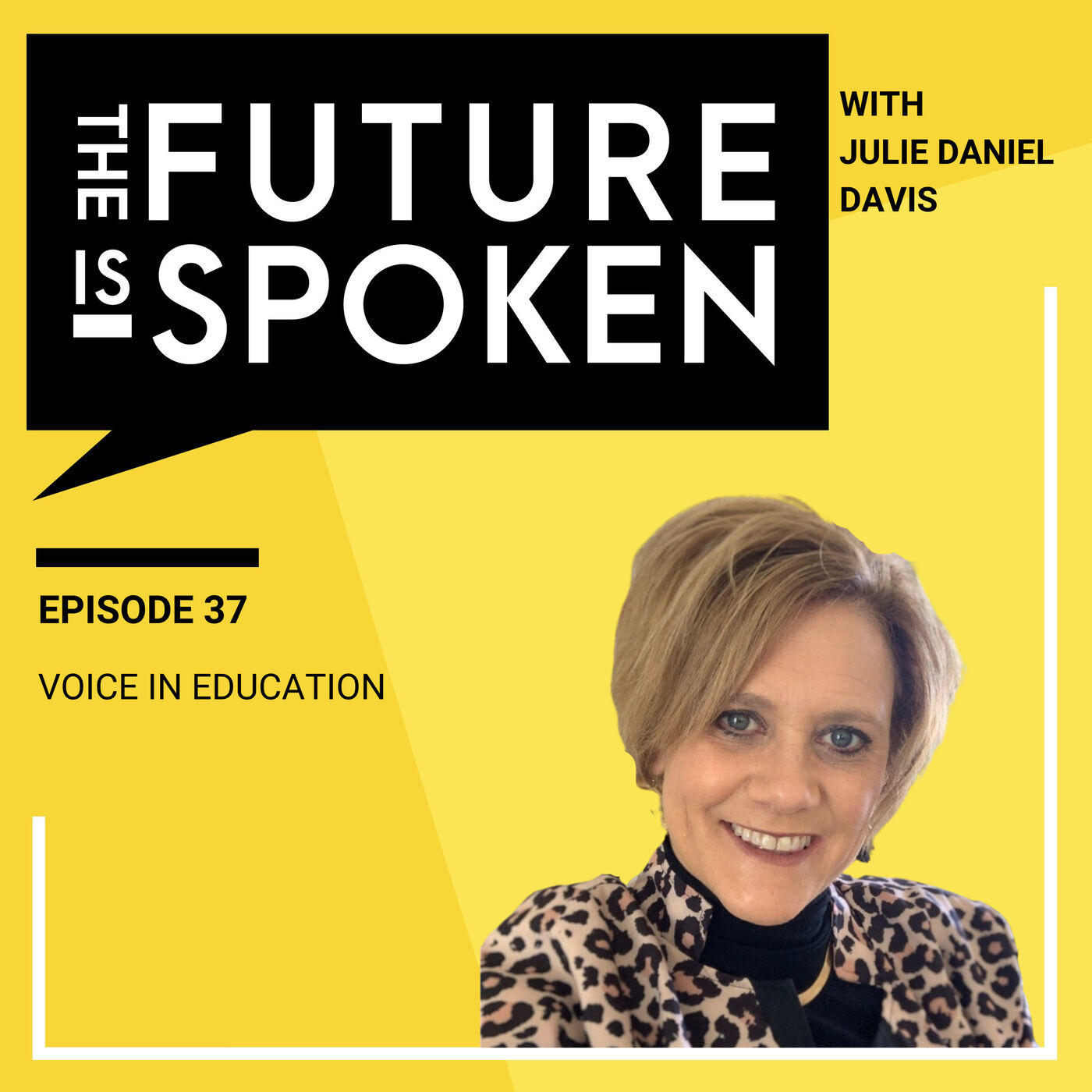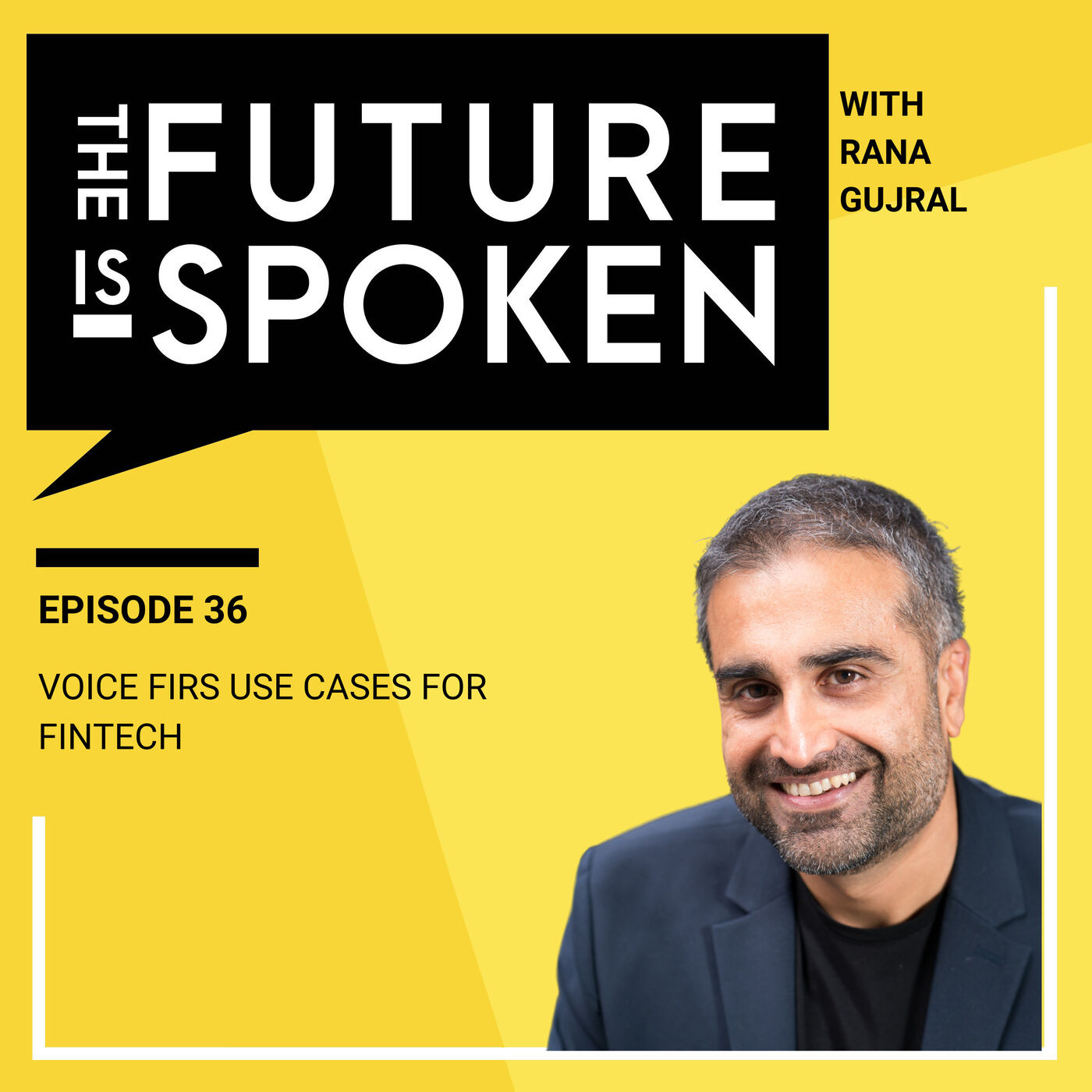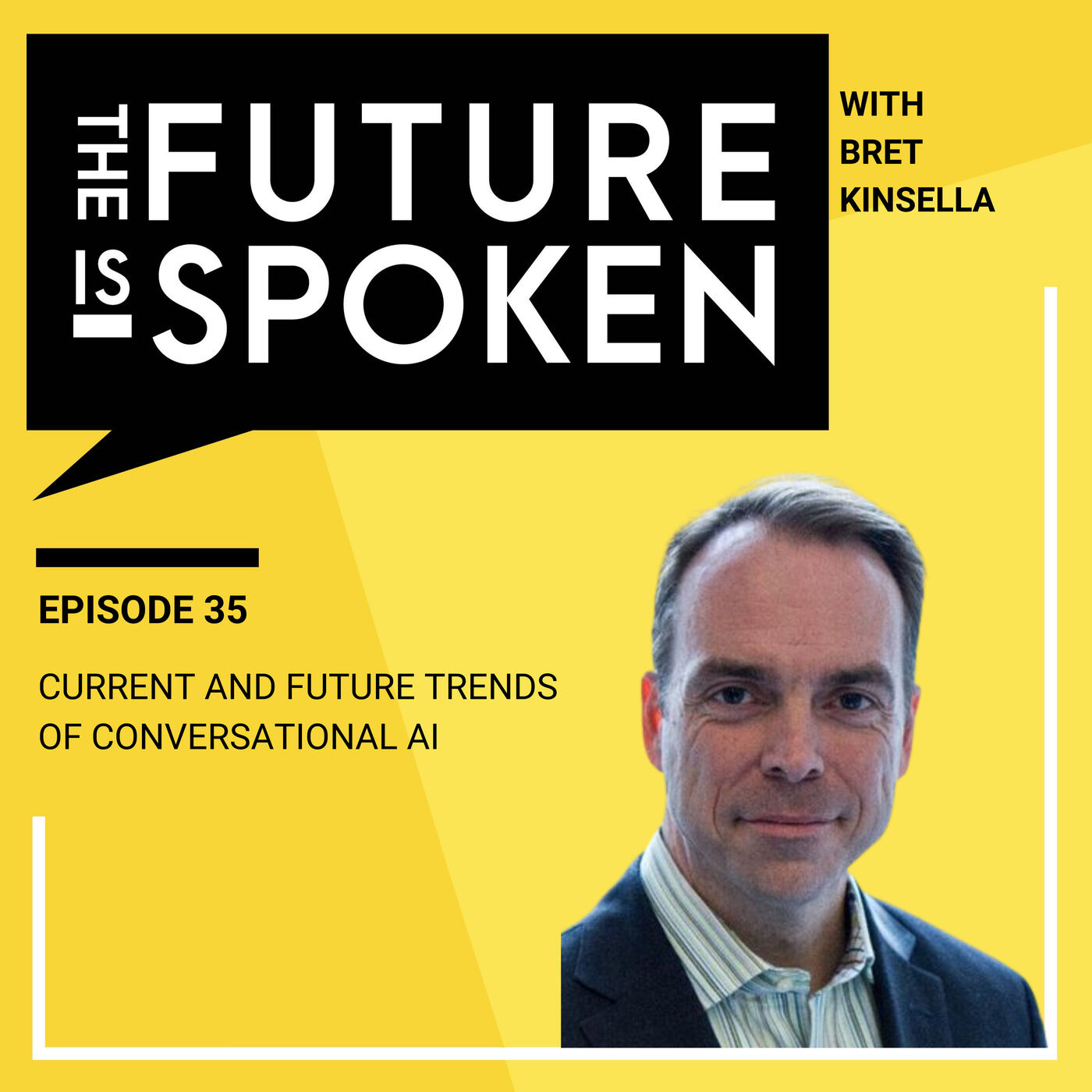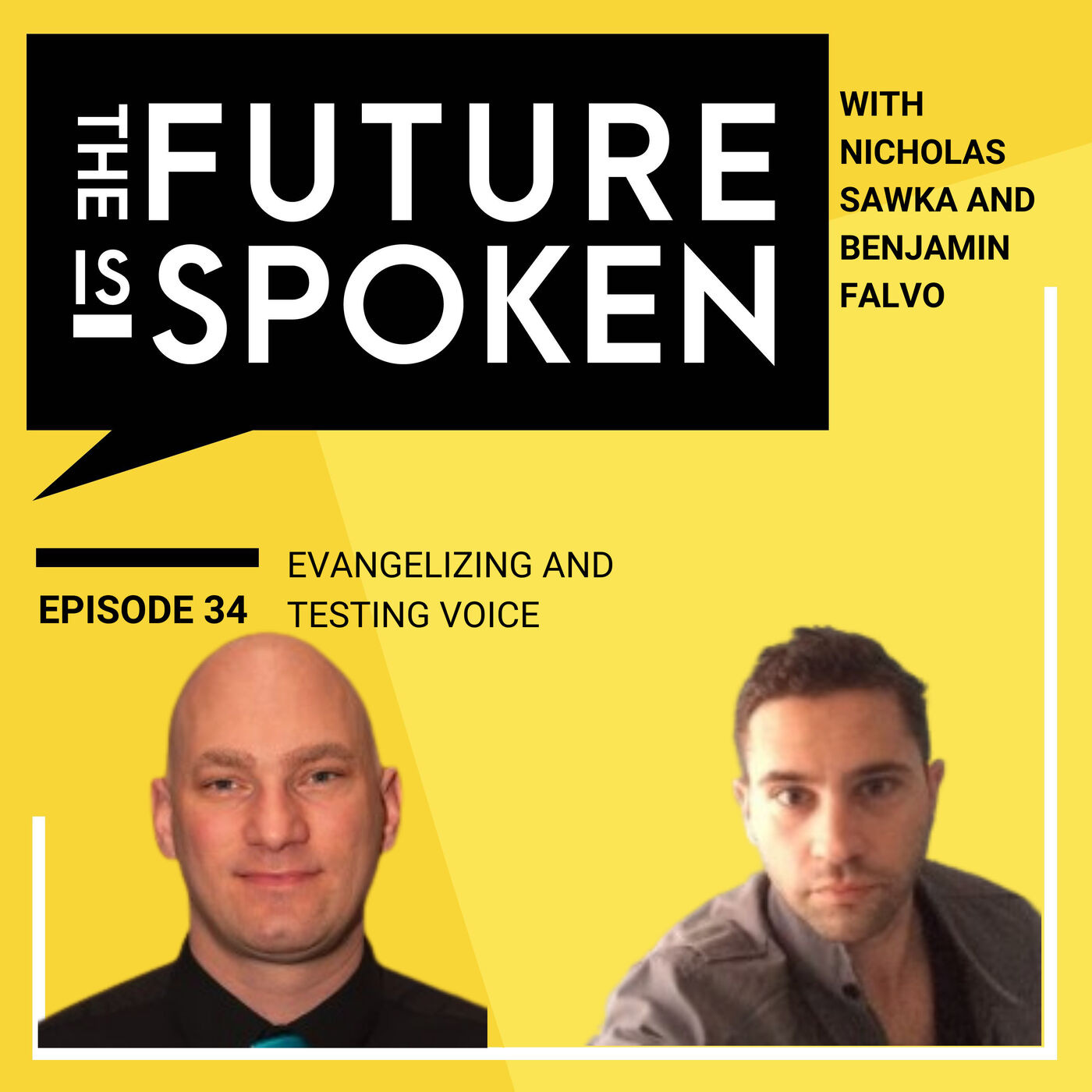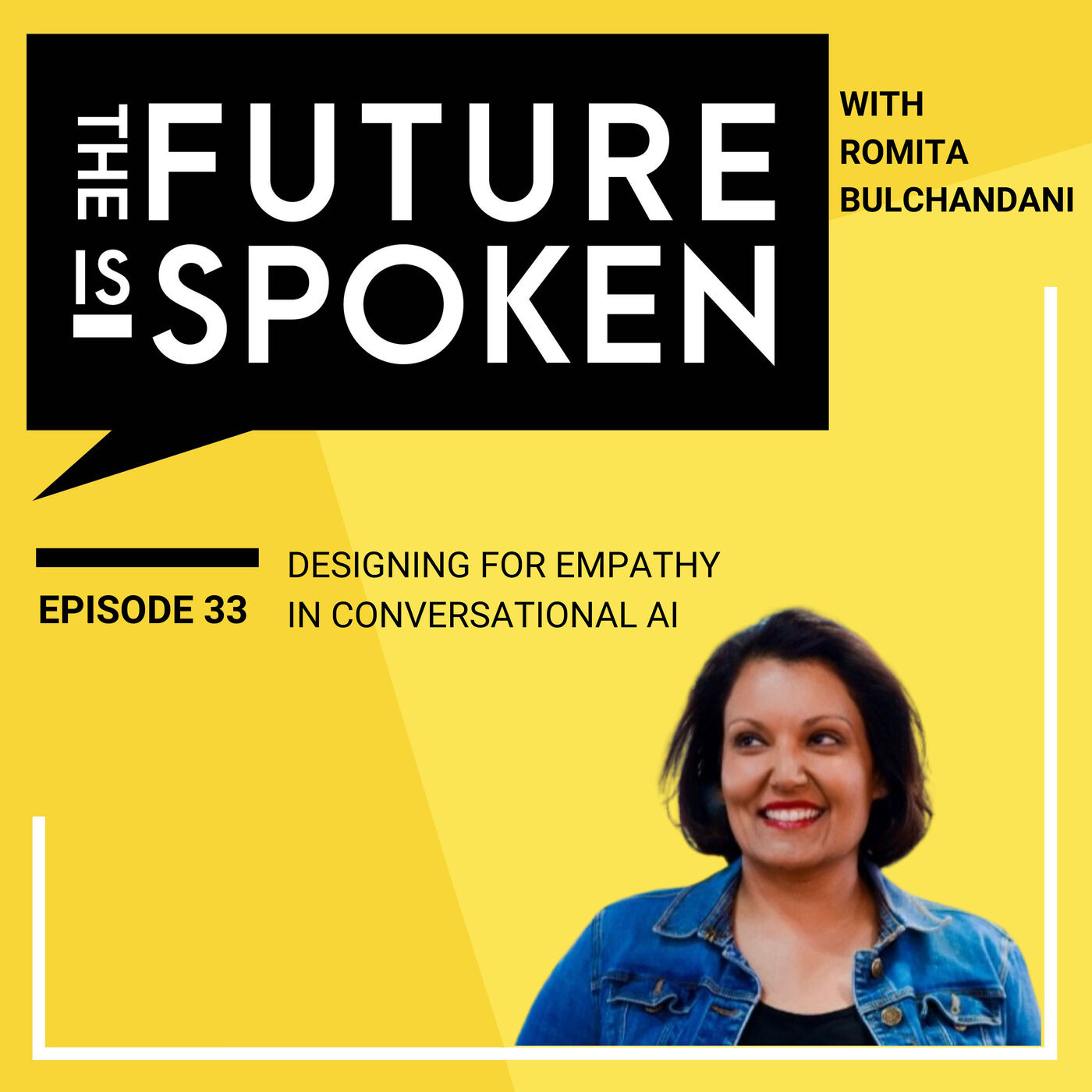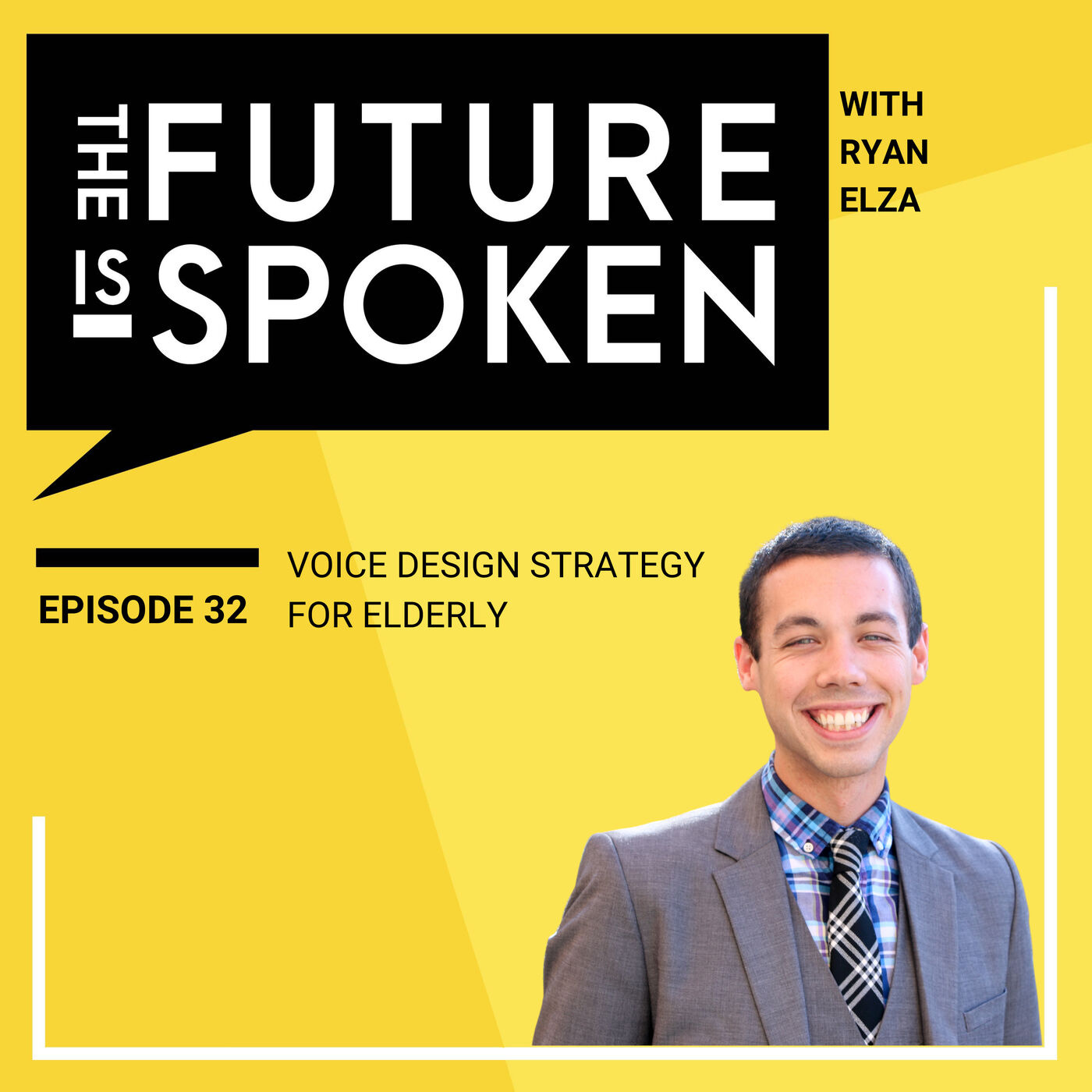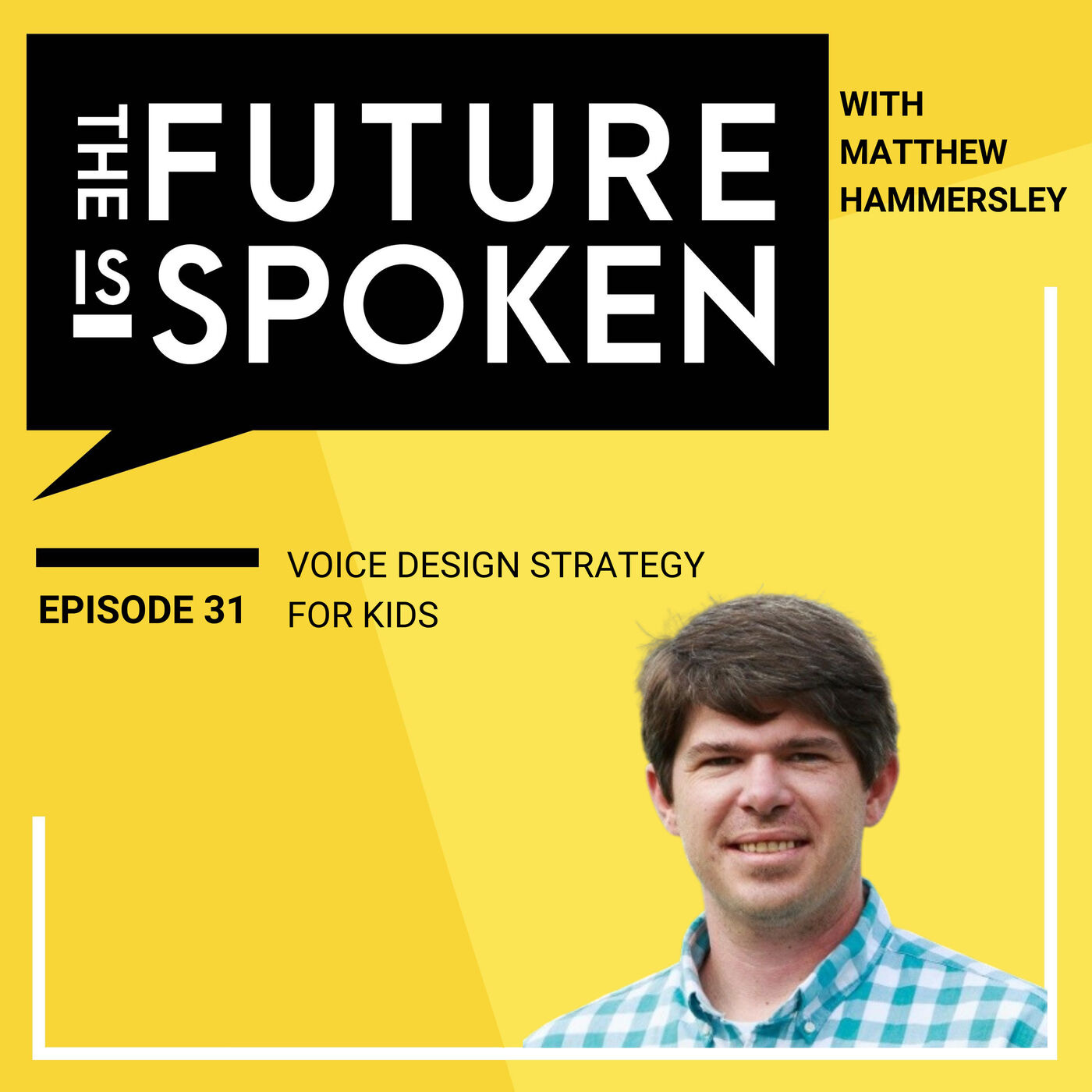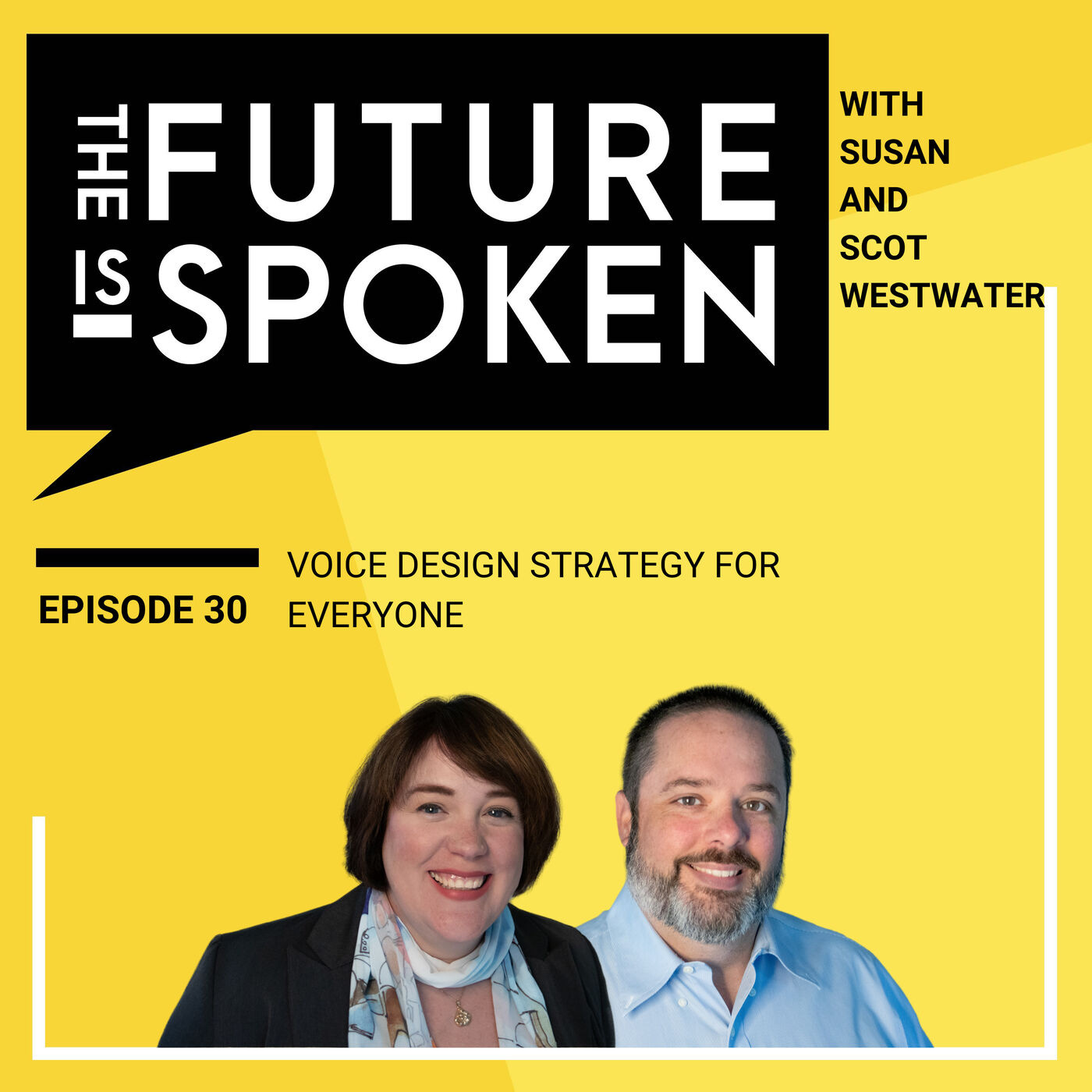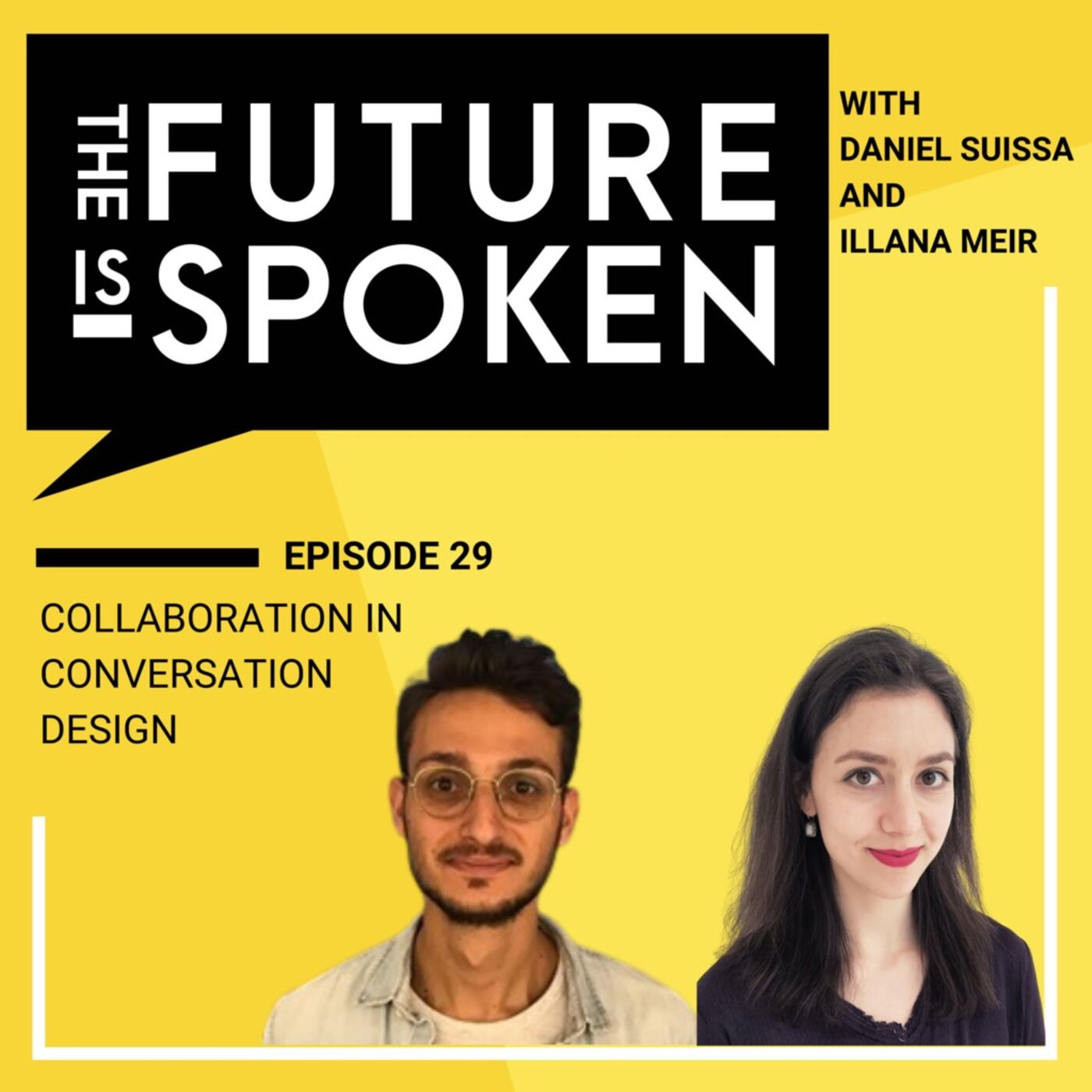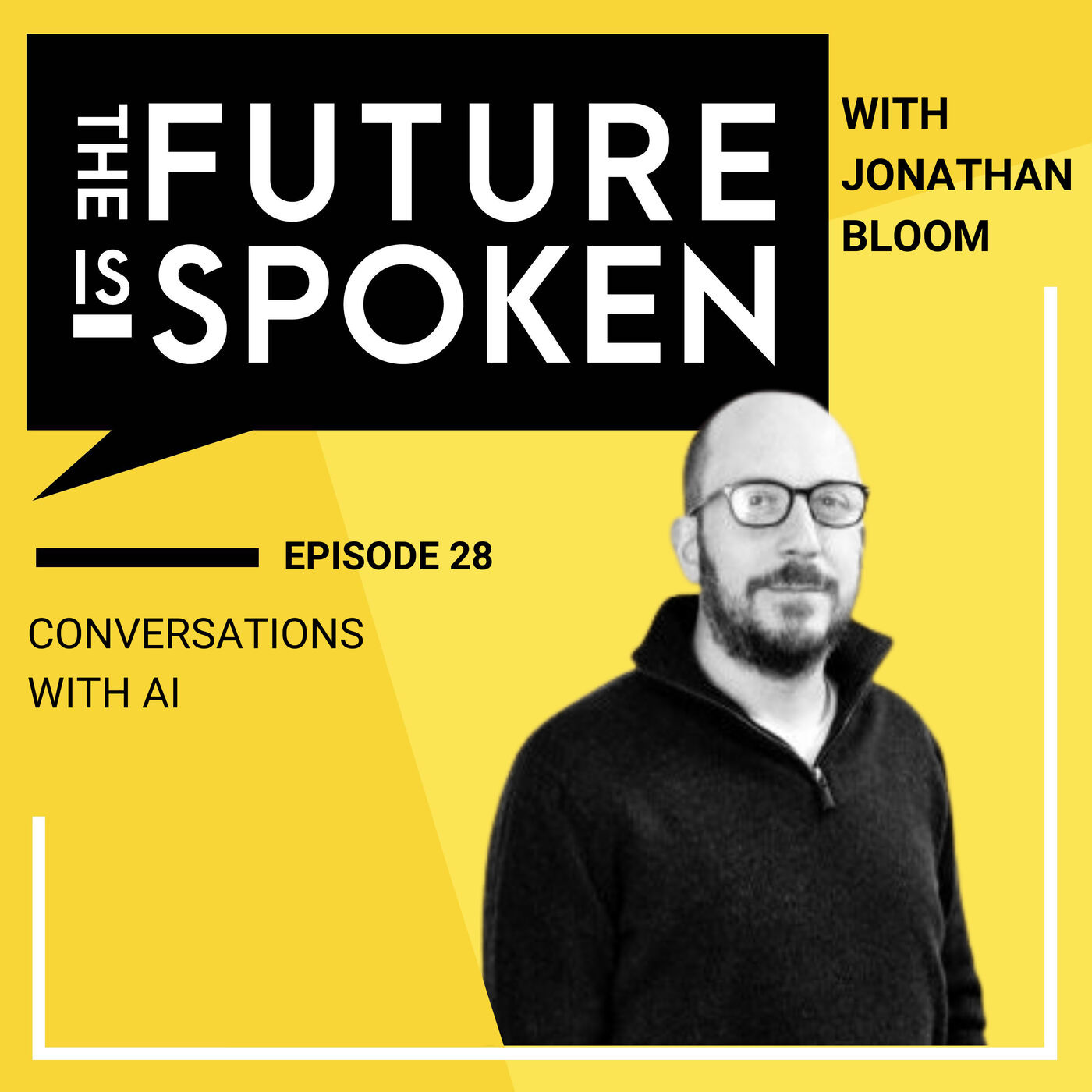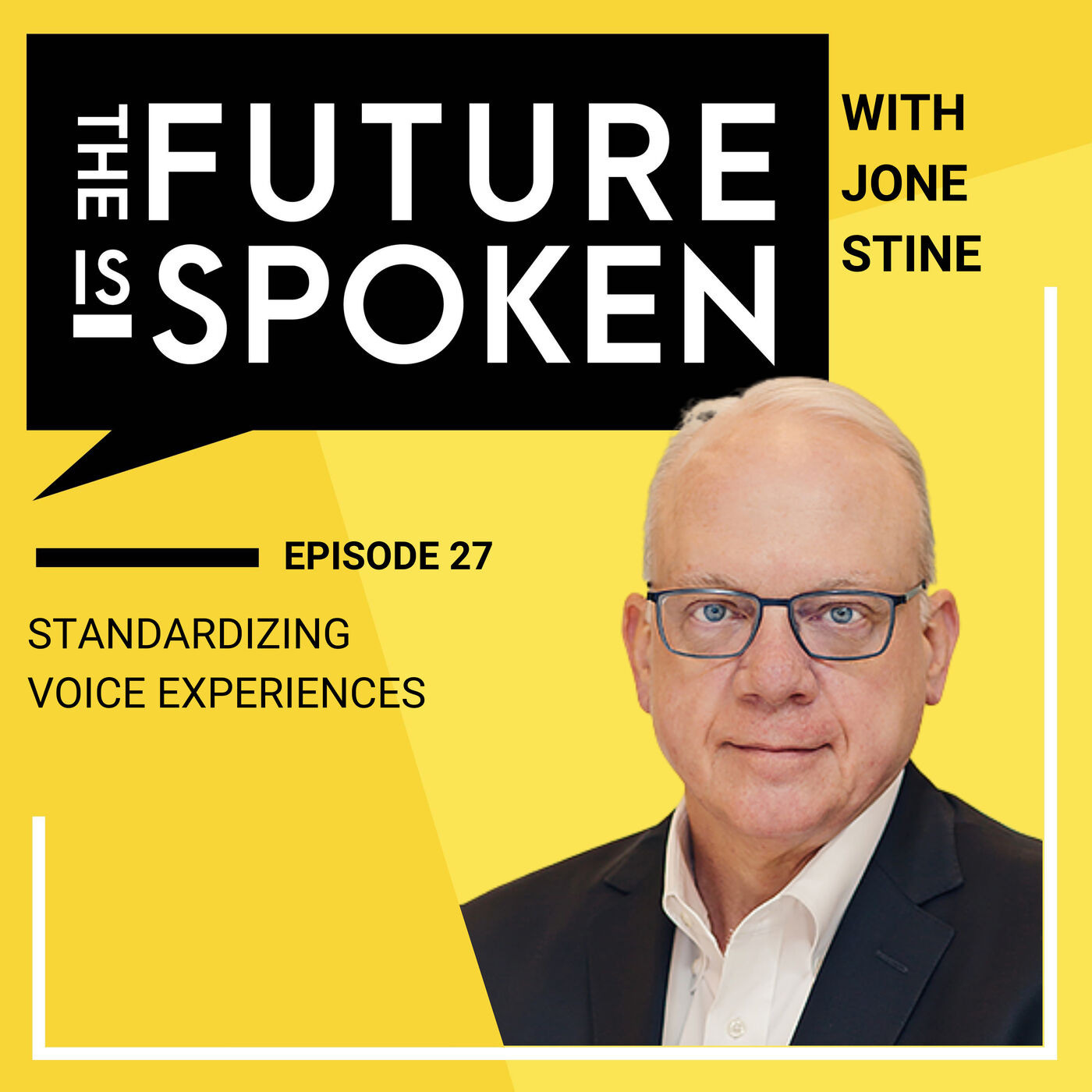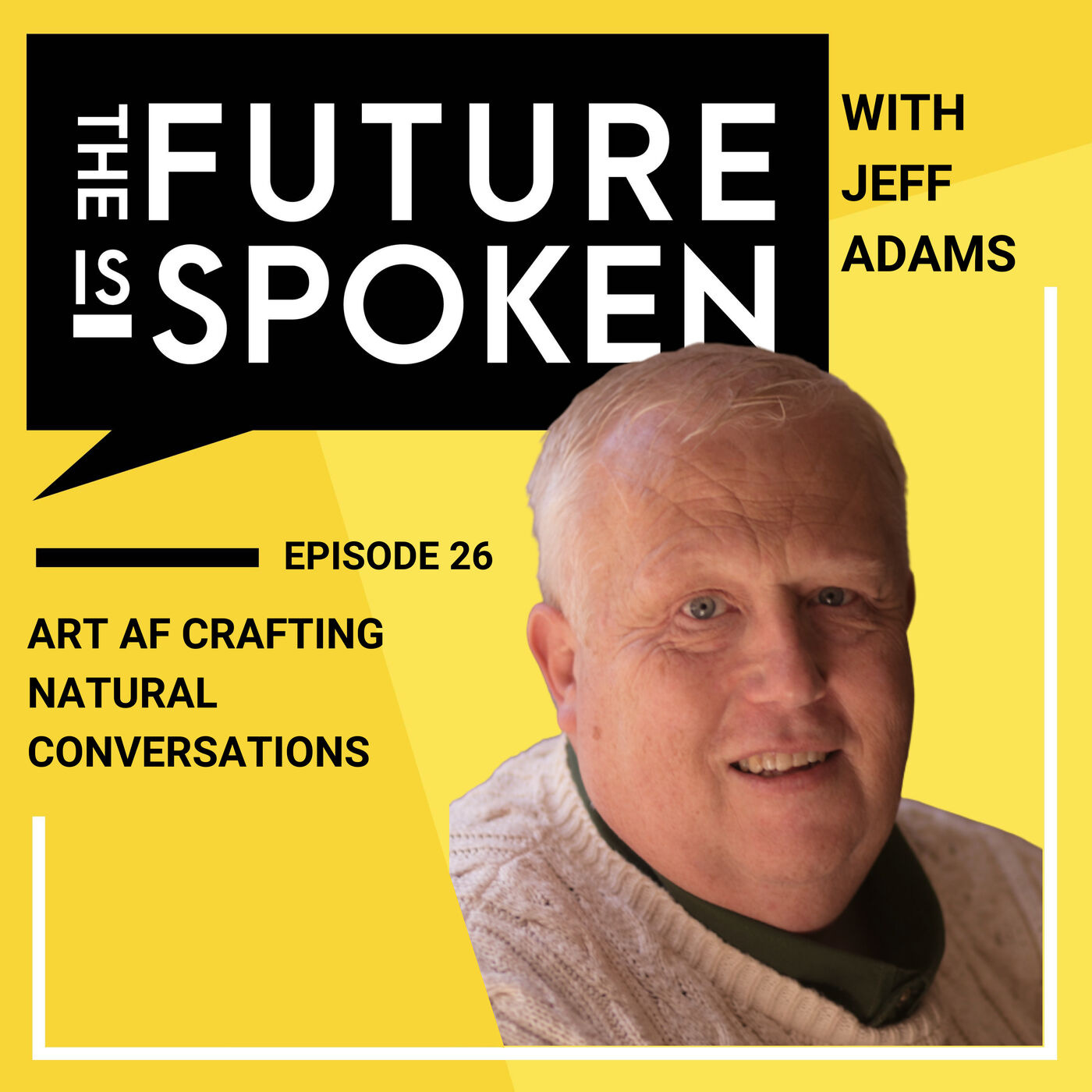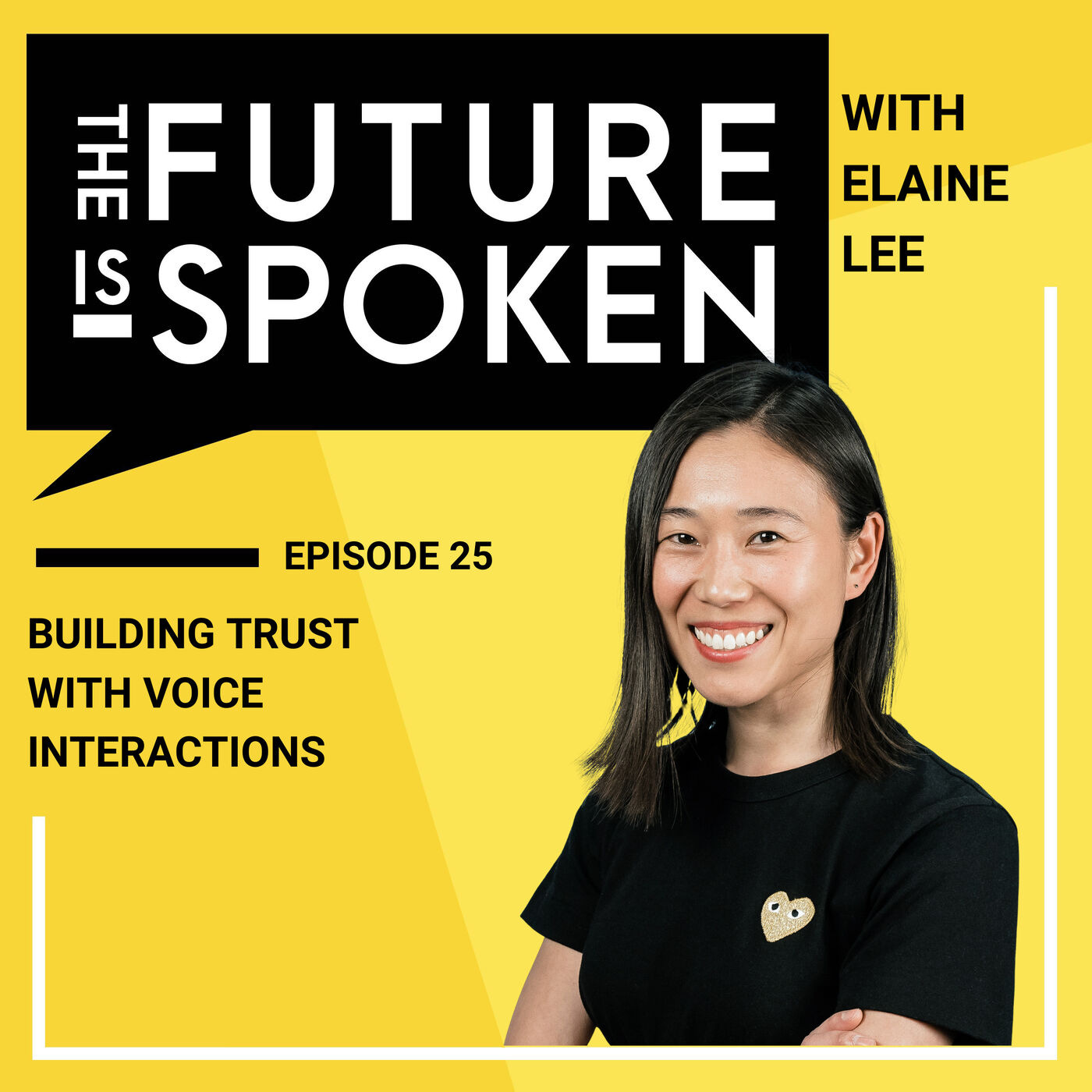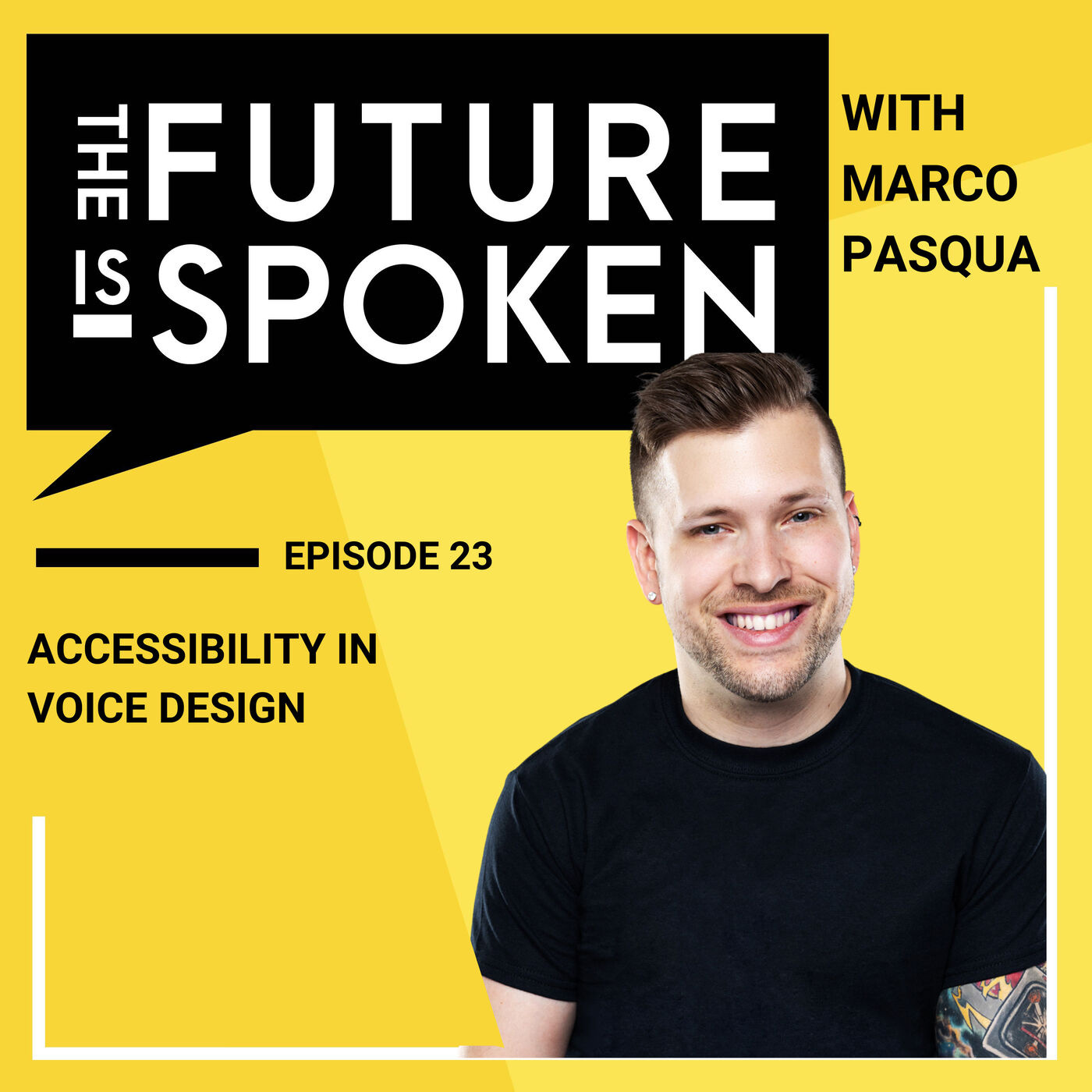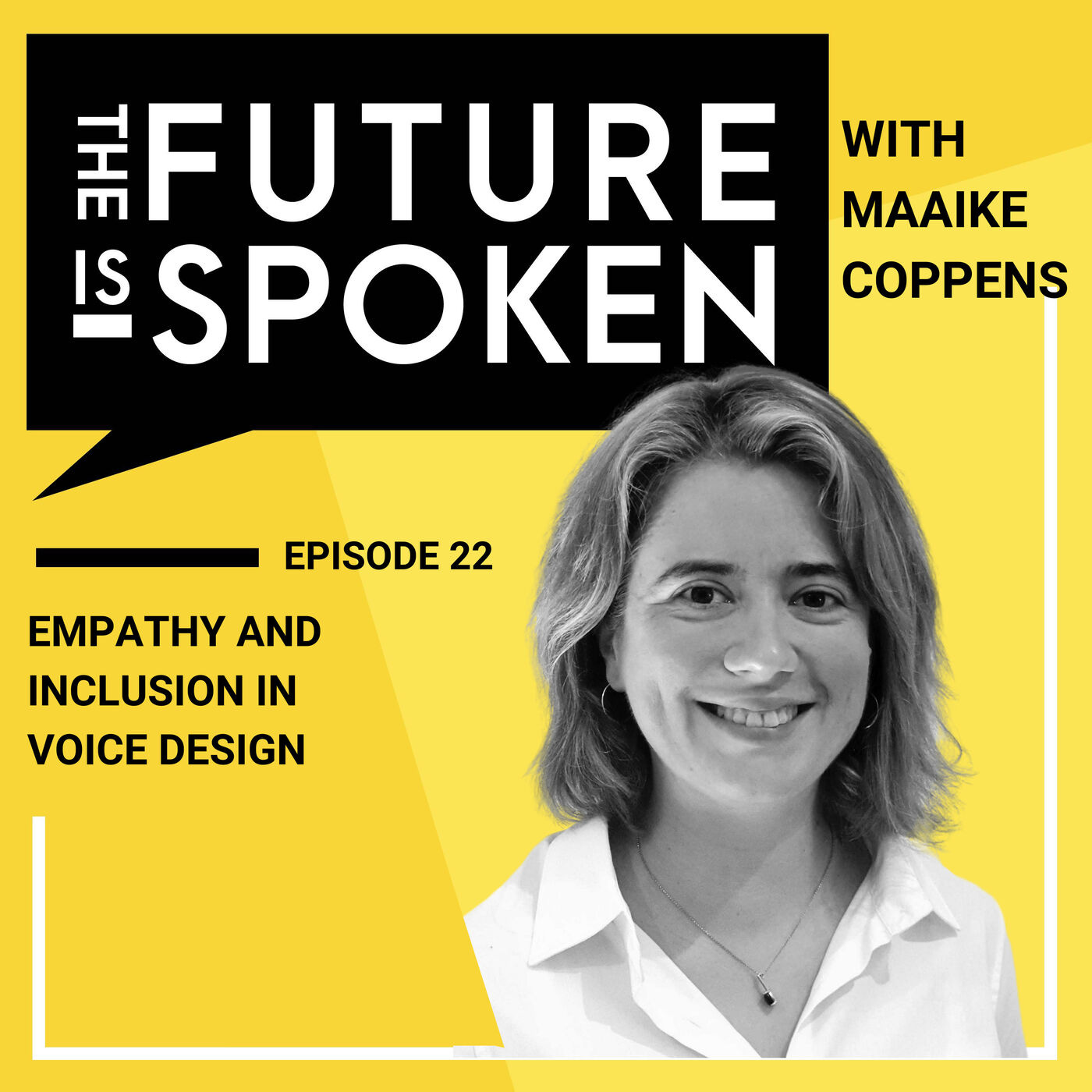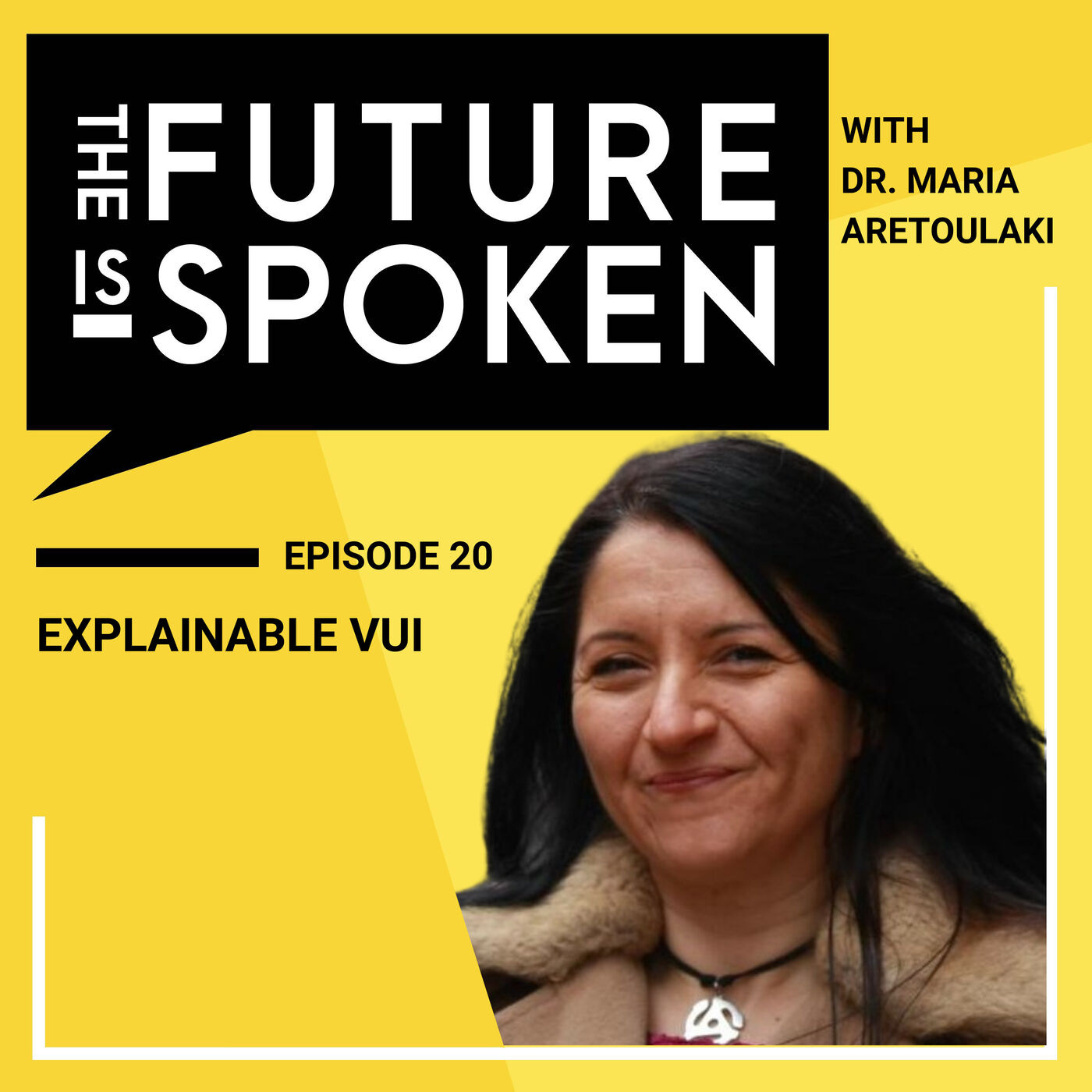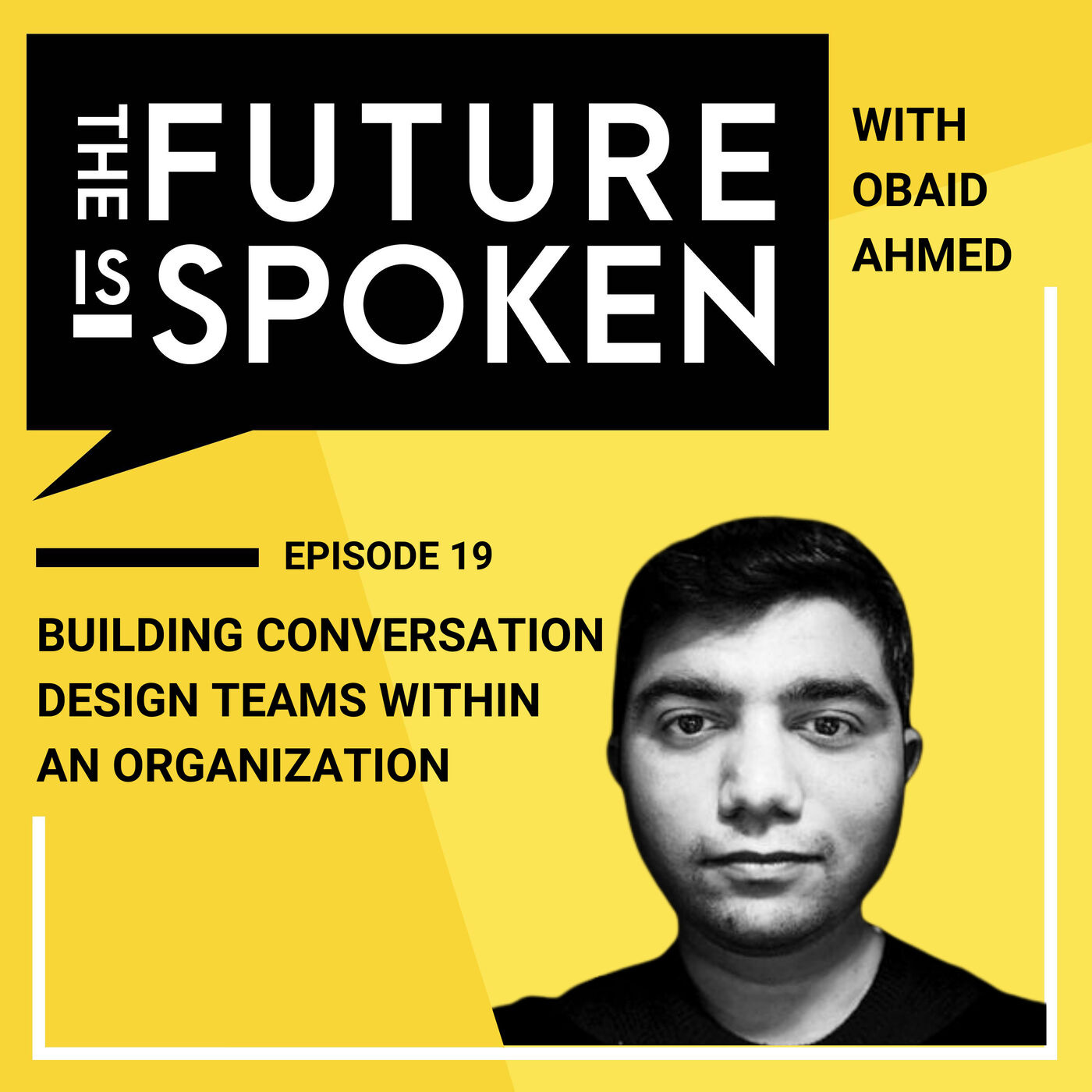Discover The Future is Spoken
The Future is Spoken

39 Episodes
Reverse
Hello and welcome to the 'Future is Spoken' produced by the digital assistant Academy. In Today's episode, Shyamala Prayaga speaks with Maikel Van Der Wouden about the Sonic branding in Voice Design.Maikel van der Wouden, a highly passionate audiophile, and design engineer has a lot of experience developing voice branding strategies and audio assets for prestigious clients, including fortune 500 companies, across various industries.Tune in now!Conversation Highlights:[00:00:46] Maikel's background as an Audio engineer working on Sonic branding. [00:03:08] Sonic branding connects users to the brand.[00:07:25] What is the relation between Sonic branding and Voice?[00:19:26] What are the different elements of Sonic branding? [00:30:15] What is the return of investment for companies to invest in Sonic branding. [00:32:31] Who all are involved in sonic brand designing? Learn more about Maikelhttps://maikelvanderwouden.com/ https://www.linkedin.com/in/maikel-van-der-wouden-4a5822112/ If you enjoyed this episode of The Future is Spoken Podcast, then make sure to subscribe to our podcast.Follow Shyamala Prayaga at @sprayaga This is a public episode. If you would like to discuss this with other subscribers or get access to bonus episodes, visit shyamalaprayaga.substack.com
Hello and welcome to the 'Future is Spoken' produced by the digital assistant Academy. In Today's episode, Shyamala Prayaga speaks with Julie Daniel Davis about the Voice First Usecases for FinTecin Education.A former accountant turned educator, Julie Daniel Davis enjoys thinking about innovative ways to enhance education and then making them happen. 15 years in the k12 setting, with the last role being Director of Instructional Technology and Innovation, led to being an educational consultant, advocate for voice technology use in education, and an adjunct Edtech professor at UT Chattanooga. Julie is striving to meet the individual needs of student and teacher and take them forward in their growth as lifelong learners in the use of Edtech. Somewhat of a futurist, she is never content with the now and is constantly striving to better the world she lives in. She is seen as a passionate person with the skills to help others catch the joy- whatever that joy might be. She is an instructional technology professional development leader/speaker, author, Amazon Alexa Champion, and Bixby Premier Developer. She believes voice technology can enhance education in mighty ways. She helps educators use technology resources to enhance critical thinking, creativity, communication, and collaboration- all skills required for students to become influencers of their world. In 2020 Julie became a CoSN Certified Education Technology Leader (CETL). Julie is the founder and host of the Voice in Education podcast that was a finalist in the 2020 Project Voice Awards. Julie has been on the planning/steering committee for EdCamp GigCity since 2015. She has served in the past as co-moderator of Twitter Chat #TnEdChat where educators from Tennessee and beyond talk about educational technology issues. She is recognized as a leader in the Canvas LMS community, where she serves as a course facilitator for the Canvas Certified Educator program. EdTech Magazine named Julie as having one of the top K-12 I.T. Blogs for 2015. She was recognized in 2021 by Amazon Alexa in their “Women in Voice” series.Tune in now!Conversation Highlights:[00:06:51] Usecases for Voice in Education [00:11:05] How to solve discoverability issues for parents? [00:15:36] How Schools can adapt to Voice?[00:21:09] Teaching Kids Digital Citizenship with Voice Technology [00:25:55] Will technical issues like limited language and accents understanding create problems with kids and their confidence?[00:30:49] How to solve equity issues with Voice, especially in the classroom?[00:02:33] Julie's Voice in Education Podcast Learn more about Juliehttps://www.linkedin.com/in/juliedavisedu/ https://www.juliedavisedu.com/podcast https://twitter.com/voiceedu1 If you enjoyed this episode of The Future is Spoken Podcast, then make sure to subscribe to our podcast.Follow Shyamala Prayaga at @sprayaga This is a public episode. If you would like to discuss this with other subscribers or get access to bonus episodes, visit shyamalaprayaga.substack.com
Hello and welcome to the 'Future is Spoken' produced by the digital assistant Academy. In Today's episode, Shyamala Prayaga speaks with Rana Gujral about the Voice First Usecases for FinTech.Rana Gujral is an entrepreneur, speaker, investor, and CEO at Behavioral Signals, an enterprise software company that excels at distinguishing behavioral signals in speech data with its proprietary deep learning technology. As a thought-leader in the AI/technology space, he often leads keynote sessions and joins panel discussions at industry events such as World Government Summit, VOICE Summit, The Next Web Conference, and Blockchain Economic Forum. His bylines are featured in publications such as Hacker Noon, Voicebot.ai, SpeechTechMagazine, and is a contributing columnist at TechCrunch and Forbes. He's been recognized as 'Entrepreneur of the Month' by CIO Magazine, awarded 'US-China Pioneer' by IEIE, and listed as a Top 10 Entrepreneur to follow in 2017 by Huffington Post and an AI Entrepreneur to Watch in Inc. In 2020 he won "Contributor of the Year: Chatbots" in Hacker Noon's Noonie's Awards.Tune in now!Conversation Highlights:[00:01:47] Rana's Journey in the Voice tech world [00:09:35] Why is the Financial sector leveraging Voice AI, and what benefits they reap?[00:13:30] How to design scalable solutions?[00:26:01] Will Voice AI synergize with brain-machine interfaces for Fintech in future? [00:37:00] How to design Bias-Free voice experiences?Learn more about Behavioral Signalshttps://behavioralsignals.com/ Learn more about RanaLinkedIn: https://www.linkedin.com/in/ranagujral/Twitter: https://twitter.com/RanaGujral If you enjoyed this episode of The Future is Spoken Podcast, then make sure to subscribe to our podcast.Follow Shyamala Prayaga at @sprayaga This is a public episode. If you would like to discuss this with other subscribers or get access to bonus episodes, visit shyamalaprayaga.substack.com
Hello and welcome to the 'Future is Spoken' produced by the digital assistant Academy. In Today's episode, Shyamala Prayaga speaks with Bret Kinsella about the Current and Future Trends of Conversational AI.Bret is the founder, CEO, and research director of Voicebot.ai. He was named commentator of the year by the Alexa Conference in 2019 and is widely cited in media and academic research as an authority on voice assistants and AI. He is also the host of the Voicebot Podcast and editor of the Voice Insider newsletter.Tune in now!Conversation Highlights:[00:01:30]: Origin story of Voicebot.ai [00:05:08]: How does Voicebot.ai conduct research? Who is the target users? [00:11:02]: Voice as marketing, nitty-gritty and expectations [00:16:18]: Why is there a rise in human-like synthetic voices? [00:20:29]: Trends to make Voice AI accessible and inclusive[00:27:49]: Voice prosthesis for people who cannot speak[00:33:21]: How many assistants do we need? [00:37:18]: Is arbitration the future? Learn more about Voicebot.aihttps://voicebot.ai/ Learn more about BretLinkedIn: https://www.linkedin.com/in/bretkinsella/Twitter: https://twitter.com/bretkinsella If you enjoyed this episode of The Future is Spoken Podcast, then make sure to subscribe to our podcast.Follow Shyamala Prayaga at @sprayaga This is a public episode. If you would like to discuss this with other subscribers or get access to bonus episodes, visit shyamalaprayaga.substack.com
Hello and welcome to the 'Future is Spoken' produced by the digital assistant Academy. In Today's episode, Shyamala Prayaga speaks with Nicholas Sawka and Benjamin Falvo from Voice Spark about Voice Evangelism and testing.Nicholas was recently brought on at Wanderword as their Chief Evangelist. Nick will represent Wanderword in the US in sales, networking, gathering product testers, and improving the use/onboarding of Fabula, Poptale and entertainment production.Nick found his passion for Alexa back in 2015 when she was first released and was part of the device's initial Beta program. In 2017 he made the jump to development and has been involved with creating over 400 Alexa Skills. Further, Nicholas has experience with working on and creating Google Actions. In addition to his love for Voice First tech, he is an experienced Chief Of Operations with a demonstrated history of working in the military industry, with a Bachelor's Degree in Business Management from the University of Phoenix. Benjamin Falvo is currently making things for Howl. Benjamin is an Intrapreneurial and strategic CIO / CTO with 20 years of diversified leadership experience across agency, startup, corporate and nonprofit environments, including numerous high-profile global projects for Fortune 500 clients. Leverages a unique blend of skills at the intersection of technical leadership, creative direction, product management, and operations management. History of ideating, designing, building and deploying highly engaging, user-friendly digital products and experiences across web, mobile and event platforms. Weekly co-host for VoiceSpark Live Podcast on thought leadership in AI and Voice First.Tune in now!Conversation Highlights:[00:03:07]: Nick Journey to Voice Tech [00:04:59]: Ben's Journey to Voice Tech[00:09:07]: Evolution of Voice Spark[00:15:00]: Voice Spark's Testing criteria for voice applications [00:21:28]: Why Voice Evangelism is essential? Guest requests for Voice Spark Livehttps://voicespark.live/contact/Submit your work/skill for review:https://voicespark.live/submit-skill-action-review/Grading Scale for Skills and Actions:https://voicespark.live/voice-spark-scoring-review-breakdown/Learn more about Nick https://www.linkedin.com/in/nicholas-e-sawka-41aa3b79/ Learn more about Ben https://www.linkedin.com/in/benjaminfalvo/ If you enjoyed this episode of The Future is Spoken Podcast, then make sure to subscribe to our podcast.Follow Shyamala Prayaga at @sprayaga This is a public episode. If you would like to discuss this with other subscribers or get access to bonus episodes, visit shyamalaprayaga.substack.com
Empathy is the first step to design any product because it is a skill that allows us to understand and share the same feelings that others feel. Through Empathy, we can put ourselves in other people's shoes and connect with how they might be feeling about their problem, circumstance, or situation. When we design products with Empathy in mind, we are making them usable and helpful. In Today's episode, Shyamala Prayaga speaks with Romita Bulchandani about Designing for Empathy in Conversational AI.Several years ago, Romita Bulchandani left her corporate dream job to live her dream life. She is now living her purpose through transformational coaching while leaving glitter trails along the way. Romita works with clients from all across the globe. As a certified coach, Romita also leans in on 15+ years of diverse leadership experience from Fortune 50 companies like The Walt Disney Company & Marriott International. Romita is driven by her real-world experiences and passion for living authentically. You can think of her as a business magician, life coach, spiritual mentor, strategic planner, and creative problem solver. Romita will find your glitter and help you bring it to the surface. To learn more about Romita's story, you may connect with her on LinkedIn. Starting with their own experiences, they end up discussing voice design strategy for the elderly population. Tune in now!Conversation Highlights: [00:06:40] Romita's story from Disney about Empathy [00:10:31] Empathy is putting yourself in user's shoes [00:16:38] How does Empathy help a brand? [00:20:51] How to Design for Empathy?[00:24:55] Empathy is everyone's responsibility Learn more about Romita and her work Linkedin: https://www.linkedin.com/in/romita-bulchandani/Instagram: https://www.instagram.com/glitterthesoul/https://www.glitterforthesoul.com/ If you enjoyed this episode of The Future is Spoken Podcast, then make sure to subscribe to our podcast.Follow Shyamala Prayaga at @sprayaga This is a public episode. If you would like to discuss this with other subscribers or get access to bonus episodes, visit shyamalaprayaga.substack.com
The Future is Spoken presents Ryan Elza as this week's guest. Ryan Elza is Vice President of Innovation and Technology at Volunteers of America National Services. Before that, Ryan was Social Entrepreneurship in Residence for Social Connectedness at AARP Foundation and led AARP Foundation's social isolation and digital inclusion work. He has an extensive background in the social determinants of health, design thinking and civic engagement. He is a recognized subject matter expert on social isolation and voice-first design for older adults. He has been at the frontier of developing voice-first solutions for low-income older adults. Ryan is a trained anthropologist, and has a master's degree in technology entrepreneurship from the University of Maryland, and is an avid mentor to students and startups at various stages of development.Prior to joining AARP Foundation, Ryan served as the Program Management Specialist and adjunct professor for the national award-winning Honors College Entrepreneurship and Innovation Program at the University of Maryland. During his tenure with EIP, Ryan developed and launched several new entrepreneurial programs and initiatives, including the EIP Terp Tank Startup Competition and the Global Entrepreneurship Semester Program. Previously, he worked at The Advisory Board Company on the performance technology team helping health systems implement transformational solutions. Mr Elza was a social entrepreneur by the practice during his undergraduate career at the University of Maryland, where he founded and scaled the UMD Chapter of Health Leads, a non-profit that trained and placed students in primary care clinics as family advocates for low-income families to find resources such as food, housing, and job training. During his tenure, he worked with hospital administrators, primary care physicians, university administrators, and student volunteers to implement a closed-loop screening and referral system for the social determinants of health. Starting with their own experiences, they end up discussing voice design strategy for the elderly population. Tune in now! Conversation Highlights:[00:02:21]: Ryan's journey to Social Entrepreneurship [00:06:01]: Barriers when designing voice experiences for the elderly population[00:11:57]: Usecases for Voice in Elderly Population[00:16:14]: Bot Personality. Do older adults understand they are interacting with an AI?[00:19:39]: Solving for discoverability through education [00:23:48]: How to design for age-related issues or disabilities?[00:33:05]: Designing for Social Isolation and mental health[00:40:09]: Designing for memory-related issues[00:42:56]: Ryan's suggestion for getting started Learn more about AARP Foundation http://www.fondationarp.org/Learn more about Ryan LinkedIn - https://www.linkedin.com/in/ryan-elza/If you enjoyed this episode of The Future is Spoken Podcast, then make sure to subscribe to our podcast.Follow Shyamala Prayaga at @sprayaga This is a public episode. If you would like to discuss this with other subscribers or get access to bonus episodes, visit shyamalaprayaga.substack.com
The Future is Spoken presents Matthew Hammersley as this week's guest. Matthew Hammersley is the Founder and CEO of the novel effect, which uses voice recognition combined with sound effects to enhance storytime for parents, teachers and children. Matt was previously a patent attorney for various companies. During his daughter's baby shower function, an idea for bringing new technology like voice recognition to the timeless tradition of reading aloud to children and making storytelling more engaging came to his mind. That is when he quit his job to start the company novel effect. Matt comes from a chemical engineering background from Clemson University. Starting with their own experiences, they end up discussing voice design strategy for everyone. Tune in Now!Conversation Highlights:[00:01:36]: Matt's journey from Chemical engineer to Cryptography and then from Patent officer to founder of Novel Effect. [00:04:45] Birth story of Novel Effect and how it all started[00:09:40] Kids have more patience than adults when things go wrong[00:12:45] Whose responsibility is it to safeguard a child's protection?[00:18:03] Handling privacy for kids[00:27:05] Targeting the right market [00:35:25] Designing custom responses for kids[00:41:05] Suggestions for aspiring conversation designersLearn more about Novel Effect on Twitter and the web: @novel_effect Novel EffectDownload Novel Effect in the App Store: Novel Effect for iOSDownload Novel Effect in Android: Novel Effect Beta for AndroidFollow Novel Effect on Facebook: Novel Effect on FacebookLearn more about Matthew at● LinkedIn - https://www.linkedin.com/in/matthammersley/If you enjoyed this episode of The Future is Spoken Podcast, then make sure to subscribe to our podcast.Follow Shyamala Prayaga at @sprayaga This is a public episode. If you would like to discuss this with other subscribers or get access to bonus episodes, visit shyamalaprayaga.substack.com
The Future is Spoken presents Susan and Scot Westwater as this week's guest. Susan and Scot Westwater are the husband-and-wife co-founders of Pragmatic Digital where they advise the world's most innovative brands that want to capitalize on the incredible opportunity Voice represents. Through their consultancy, Susan and Scot help clients solve their marketing and customer experiences problems using customer-centric approaches to plan and create useful and usable Voice experiences for their audiences. They have presented and authored several talks, workshops, articles, and ebooks focused on the role Voice technology plays in marketing and business strategy. Together, they authored the book Voice Strategy: Creating Useful and Usable Voice Experiences and are working on a second book titled Voice Marketing which will be released in Spring 2022. Susan and Scot are also co-founders of Voice Masters, an online education program designed to teach innovative business teams about Voice and Voice strategy and ambassadors for the Open Voice Network and instructors for the Marketing AI Institute AI Academy. They both were recognized in Voicebot's Top 68 Leaders in Voice 2020, and Scot was recently included in Sound Hound's "Top 40 Voice AI Influencers to Follow on Twitter." Starting with their own experiences, they end up discussing voice design strategy for everyone. Tune in Now!Conversation Highlights:[00:02:28]: Learn how Susan's experience from content and Scot's experience from product design background helped them start a pragmatic digital voice strategy company. [00:05:05]: What does voice strategy mean, and why is it important? [00:07:17]: Why is it important to balance the user needs and business needs to design better Voice strategies [00:11:44]: Voice strategy involves thinking about the use case itself, like where Voice fit into the overall digital strategy to think about how even to convince the stakeholders and ROI of the investment. [00:16:03]: Dont rush; adopt a crawl, walk, run approach to designing Voice products[00:22:45]: Testing is iterative[00:23:23]: Data is the king to design strategies[00:33:49]: Build vs buy strategy and which is better?[00:42:42]: Marketing is not a four-letter word. Involve them in your process early on[00:53:50]: Suggestions for aspiring conversation designersSusan and Scot's book Voice Strategy: Creating Useful and Usable Voice Experiences - www.voicestrategybook.com Voice Masters - www.voicemasters.ai Open Voice Network – Voice assistance worthy of user trust. https://openvoicenetwork.org/ Other Books: Designing Voice User Interfaces: Principles of Conversations Experiences - Cathy Pearl How to Make Sense of Any Mess - Abby Covert The Content Strategy Toolkit - Meghan Casey Audio Branding: Using Sound to Build Your Brand - Laurence Minsky and Colleen Fahey Learn more about Scot at● LinkedIn Learn more about Susan at● LinkedIn If you enjoyed this episode of The Future is Spoken Podcast, then make sure to subscribe to our podcast.Follow Shyamala Prayaga at @sprayaga This is a public episode. If you would like to discuss this with other subscribers or get access to bonus episodes, visit shyamalaprayaga.substack.com
The Future is Spoken presents Daniel Suissa and Ilana Meir as this week's guest. Ilana Meir is a Conversation Designer at Facebook Reality Labs. There, she works with a cross-functional team with AR/VR technologies, namely Oculus and Portal. Ilana approaches her work with a cultural lens: first seeking to understand the cultural underpinnings of behaviour in a space and then how a new product will affect them. For her contributions to the design field and voice community, Speech Technology magazine named Ilana a "Speech Technology Luminary”.Daniel Suissa is a software engineer at Facebook Reality Labs, working on knowledge bases for conversational AIs focusing on media-related interactions. He previously helped build the personal finance manager Exeq (acquired by RetailWorx), helping young folks understand their spending and connect with their favourite local merchants. Daniel comes from a background in data representation and understanding from the IDF, where I led a team of analysts that advised military leadership on resource management & strategy. Starting with their own experiences, they end up discussing collaboration in conversation design. Tune in Now!Conversation Highlights:[00:01:39] Ilana’s journey towards conversation design[00:03:01] Daniel’s journey into conversation design [00:05:34] how does the Interaction between designer and developers look?[00:10:11] Learn from Daniel’s experience how developers can adapt to user centered approach [00:11:33] How is designing for scannability different from listenability? [00:13:31] Information Architecture in conversation design is key[00:19:53] What is fun about working as a designer with a group of developers?[00:21:11] Best practices to get into conversation design spaceLearn about Ilana at● LinkedInLearn more about Daniel at● LinkedInIf you enjoyed this episode of The Future is Spoken Podcast, then make sure to subscribe to our podcast.Follow Shyamala Prayaga at @sprayaga This is a public episode. If you would like to discuss this with other subscribers or get access to bonus episodes, visit shyamalaprayaga.substack.com
The Future is Spoken presents Jonathan Bloom as this week’s guest. Jonathan is a Senior Conversation Designer for Google, focusing on the Google Assistant. Jon was previously the UX Research Lead for Jibo, Inc., creators of the social robot of the same name. Jon was also Senior Voice User Interface Manager for Nuance Communications, where he sat on Nuance’s Innovation Steering Committee. Over his 20-year career, Jon has designed graphic, speech, and multimodal user interfaces for robots, IVR’s, dictation software, cars, and mobile applications. Jon holds a Ph.D. in Cognitive Psychology from the New School for Social Research. Starting with their own experiences, they end up discussing Standardizing Voice Experiences. Tune in now!Conversation Highlights:[00:03:39]: Jonathan's journey from Nuance to Google[00:10:45] : Multimodal Design and how it helps [00:13:03] : Why do people expect Emotionally Intelligent Digital Assistants?[00:17:52]: Does anthropomorphism lead people to expect more? [00:22:37]: People are expecting more from the assistance. Where do we draw that balance? [00:31:40]: How much is too much personality?[00:45:17]: Script writing keeps Jonathan inspired[00:48:00] Jonathan encourages new conversation designers to read these books Cathy Pearl's - Designing Voice User InterfacesLearn more about Jon at- LinkedIn- TwitterIf you enjoyed this episode of The Future is Spoken Podcast, then make sure to subscribe to our podcast.Follow Shyamala Prayaga at @sprayaga This is a public episode. If you would like to discuss this with other subscribers or get access to bonus episodes, visit shyamalaprayaga.substack.com
The Future is Spoken presents Jon Stine as this week’s guest. Jon Stine is the Executive Director of The Open Voice Network (OVN), a non-profit global association dedicated to bringing the benefit of standards to the world of artificial intelligence-enabled voice assistance. The OVN is a Directed Fund of The Linux Foundation. He brings to this role more than 30 years of global leadership in the commerce and technology industries. Jon’s retail industry knowledge was first shaped in the womenswear apparel business, as he headed sales of a well-known national brand to leading US department and specialty stores. In 2000, he joined the Intel Corporation to create and head its first global outreach to the retail and consumer goods industry. In the years that followed, he was a co-founder of the Metro Group Future Store Initiative in Germany, and the Pan-Pearl River Delta Initiative that first brought digital transparency to the China-to-US supply chain. He joined Cisco Systems retail-CPG consulting team in late 2006, and later headed Cisco’s North America consulting practice for retail-CPG. In 2014, he returned to Intel as the Global Enterprise Sales General Manager for the retail, hospitality, and consumer goods industries. He stepped away from Intel in 2019 to build The Open Voice Network. Through the years, Jon has worked directly with customers across the Americas, Western and Central Europe, Middle East, India, China, and Japan, as well as delivery partners in hardware, software, services, and consulting. Jon resides in Portland, Oregon, USA. Starting with their own experiences, they end up discussing Standardizing Voice Experiences. Tune in now!Conversation Highlights:[00:04:05]: Story of Open Voice Network Inception- Listen how a group of met over coffee and ended up starting open voice network. [00:06:39]: Voice is at the same stage as User Experience was before 2006. - Jon and around 180 volunteers are working together to bring voice standards to life. [00:07:19]: Value of Standards [00:12:05] How do we make Voice trustworthy?[00:13:29] Voice Standards needs regulation like Accessibility to empower users [00:16:06] What is being done to make Voice more Ethical? [00:17:32] Privacy and Security. How do we protect it? And what values might we promote?[00:27:12] Voice is a crowed space, will users select Voice assistant based on Standards?[00:33:43] Designers and Developer can all add value to Open Voice Network. Learn more about Jon at- LinkedIn- Open Voice NetworkIf you enjoyed this episode of The Future is Spoken Podcast, then make sure to subscribe to our podcast.Follow Shyamala Prayaga at @sprayaga This is a public episode. If you would like to discuss this with other subscribers or get access to bonus episodes, visit shyamalaprayaga.substack.com
The Future is Spoken presents Jeff Adams as this week's guest. Jeff has been leading prominent speech & language technology research for more than 20 years. Until 2009, he worked at Nuance / Dragon, where he was responsible for developing and improving speech recognition for Nuance's "Dragon" dictation software. He presided over many of the critical improvements in the 1990s and 2000s that brought this technology into the mainstream and enabled widespread consumer adoption.After leaving Nuance, Jeff joined Yap, a company specializing in voicemail-to-text transcription. He assembled a strong team of 12 speech scientists who, within two brief years, were able to beat all competitors on an unbiased test set. They also matched the performance of a competitor who used (off-shore) human transcription.Yap's success caught the interest of Amazon, who wanted to jump-start their new speech & language research lab. Upon acquisition, Jeff led efforts to build one of the industry-leading speech & language groups. His Amazon team developed products such as the Echo, Dash, and Fire TV. Jeff left Amazon in 2014 to found Cobalt Speech and Language.Starting with their own experiences, they end up discussing crafting natural conversations for the bot.Tune in now!Conversation Highlights:[00:28] The journey to Voice…..● Jeff has been working on speech technology for almost 26 years now. He started with a small speech company in Boston.● He ended up working at Amazon on Alexa before it was launched.● Cobalt work with companies that are looking for speech-related technologies. It is a company that licenses technology and also customizes it.[03:58] Can anyone design natural conversations?● Jeff explains that it is an art to designing natural conversations. One way to approach this is to assume the system as a human.● He also talks about designing a system that can cater to everyone's needs.● Giving the user what they are looking for is what matters! Jeff touches on building a system that responds appropriately to all the different ways people ask for something.[15:10] Creating a bot despite the lack of resources?● Jeff divulges different ways of creating a natural voice application despite the lacks of resources.● A slow launch with a lot of beta testing is the key.[18:41] NLP v/s NLU● Jeff explains the difference between Natural Language Processing and Natural Language Understanding.● NLP is a broad umbrella term referring to any computerized processing of human language, while NLU is a subset.● What are the uses of NLU?● Spoken Language Understanding is Automatic Speech Recognition(ASR) + NLU.● Jeff also touches on ensuring a system that understands what the user says.[34:04] The secret sauce for the ASR systems to work better!● Jeff elaborates on the different approaches for the ASR systems to work together.● How can we design a speech recognition system that understands the users in the natural environment?[41:41] What are the Best Practices while designing a speech system?[44:15] Must Listen● Jeff's piece of advice for someone trying to get into Speech Recognition.Learn more about Jeff at● LinkedIn● Or email him at INFO@COBALTSPEECH.COM.If you enjoyed this episode of The Future is Spoken Podcast, then make sure to subscribe to our podcast.Follow Shyamala Prayaga at @sprayaga This is a public episode. If you would like to discuss this with other subscribers or get access to bonus episodes, visit shyamalaprayaga.substack.com
The Future is Spoken presents Elaine Lee as this week's guest. Elaine Lee is a designer specializing in artificial intelligence and machine learning, with a focus on ethical AI. She's currently a Principal Product Designer at Twilio on the AI team, and previously led the design of eBay's AI-powered shopping assistant on Facebook Messenger and Google Assistant.Starting with their own experiences, they end up discussing the building a trustworthy voice assistantTune in Now!Conversation Highlights:[00:01:32]: Elaine’s journey from Psychology to Product Design[00:02:37]: Elaine’s experience building conversational bots with EBay[00:05:20]: Twilio AutoPilot PlatformAutopilot is a developer centric tool to create conversational AI bots for various text and voice based platforms, [00:08:17] Tips for building Natural Language System [00:10:56] Differences designing for chatbot vs Voicebots[00:18:19] Best practices for building trust with voice assistants and conversational AI bots[00:23:52] Disambiguations strategies to build trust [00:32:22] Expectations setting for building trust [00:41:54] Elaine’s advice for aspiring conversation and VUI designers Learn more about Elaine at● LinkedInIf you enjoyed this episode of The Future is Spoken Podcast, then make sure to subscribe to our podcast.Follow Shyamala Prayaga at @sprayaga This is a public episode. If you would like to discuss this with other subscribers or get access to bonus episodes, visit shyamalaprayaga.substack.com
The Future is Spoken presents Rupal Patel as this week's guest. Rupal is the Founder and CEO of VocaliD, a voice Al company that creates unique synthetic voices. Unlike conventional methods, VocaliD's award-winning technology generates high-quality, natural-sounding voices within hours, not months. They leverage cutting-edge machine learning techniques, proprietary Voice blending algorithms, and our crowdsourced Voicebank dataset to enable brands and individuals to be heard in a voice that is uniquely theirs. Vocal Id is a spin-out from her research lab at Northeastern University. She is a tenured professor in the Department of Communication Science and Disorders and the Khoury College of Computer Sciences.Starting with their own experiences, they end up discussing synthetic voices.Tune in Now!Conversation Highlights:[00:23] The journey to Synthetic voices…..● Rupal works on making customized synthetic voices for individuals as well as for companies. She started the mission to create voices for people who couldn't speak.● She also explains how the world of Voice is touching the sky right now.[03:32] Identifying the problem…….● Rupal explains the reason behind creating the Vocal ID. She divulges the problems she identified while researching people with speech impairment.● People with limited speech capabilities still can control the prosody of their Voice.● What does it take to create a natural-sounding voice?[11:47] Tuning the prompt according to your need.● Rupal speaks about the different ways to tune the prompt for the pitch or speed or even the tone. The end-to-end synthesis methodologies allow controlling Speech differently.● They have also started implementing a new method to make a change at the word level. She is also excited about some of the style modifications.[20:09] The importance of Natural Sounding Voice● She elaborates that almost every way we are consuming information is through our ears. Because of so much audible capability, you need to have a natural voice.[22:18] What secret skill do you need to enter the 'Text to Speech' world?● She touches on the skills you need to enter the world of Speech and design natural sounding voices.● Linguistics is becoming the heart of Voice.[26:11] Researching is the most crucial aspect of everything.● Rupal explains that apart from doing experiments on building up the voices and making them sound more natural, they are also doing listening perception experiments to understand how consumers have different preferences for Voice.● She also touches on how they ensure that the quality remains up to par and the operating system's role in amplifying the quality.[40:36] How is Vocal ID different from others?● Vocal ID is focused on customized Voice as supposed to specific libraries that other companies possess.● Machine learning can get you to 90% of the way, but you will require an understanding of Speech to reach that last mile.[46:40] Must Listen● Rupal's piece of advice for someone trying to get into the world of Voice.Special Reminder:Celebrate The Diversity of Human Voices! Will You Share your Voice?Join others from around the world in sharing the gift of Voice. Register today. Learn more about Rupal at● Vocalid.ai● LinkedIn● Vocalid.ai/voicebankIf you enjoyed this episode of The Future is Spoken Podcast This is a public episode. If you would like to discuss this with other subscribers or get access to bonus episodes, visit shyamalaprayaga.substack.com
The Future is Spoken presents Marco Pasqua as this week's guest. Marco is Co-founder of LIKE ventures and an award winning speaker and Entrepreneur.Starting with their own experiences, they end up discussing the act of accessibility and inclusion in Voice Design.Tune in Now! Conversation Highlights:[00:02:11]: 2008 Lay off which lead to a career in AccessibilityLearn Marco's journey from the video game industry to evangelizing Accessibility.During the 2010 recession, losing job opened new avenues for Marco in the world of accessibility expert, public speaking and entrepreneurship.[00:06:06] LIKE Venture and Marco's Journey towards building an accessible future Marco talks about LIKE Ventures all virtual Accessibility conference scheduled for October 14thDiscusses ways to make online events and conferences accessible for everyone[00:13:02] Accessibility and Meaning Access are two different thingsMarco explains Accessibility is not about making different products for different people and making one that everyone can use.Marco's interesting example for explaining difference between accessibility and meaningful access:"for example, for a building to have a ramp outside a door and then say, Oh, people can get inside the front door. Right. But then ask yourself, where is that ramp located? Is it actually at the front door or is it at the back of the building near a trash can or near the dumpster? So that you're saying, well, by the way, we have accessibility, but it means that you have to come through a different entrance, but thats ok.Right. Because you're just like everybody else. No meaningful access is when every single person who's expected to use a product or service can use it in exactly the way it's intended without having to feel like they have to adapt themselves to meet the function of the product. But rather that the product is already thinking about how everyone, whether you're nine or 90 can use it."[00:18:22]: Accessibility by Design Marco explains Accessibility is always an afterthought for manyAccessibility is more of a money minting machine for the government He explains how there is a lack of accessibility awareness with many companies and individuals [00:23:04]: Making Voice Application more accessible Knowing user personal circumstances and preferences how we can make voice interactions more accessible Using dialogues and conversation design how we can make show empathy and guide disabled users [00:45:11]: Must Listen How Voice technology is helping Marco prepare for the arrival of his baby Learn more about Marco at● LinkedIn● TwitterIf you enjoyed this episode of The Future is Spoken Podcast, then make sure to subscribe to our podcast.Follow Shyamala Prayaga at @sprayaga This is a public episode. If you would like to discuss this with other subscribers or get access to bonus episodes, visit shyamalaprayaga.substack.com
The Future is Spoken presents Maaike Coppens as this week's guest. Maaike is an international Conversation Design Expert, speaker and co-author of the Voice UX Workbook. With a successful background in linguistics and UX design, Maaike found conversational design the perfect blend.Over the last couple of years, Maaike has worked with award-winning agencies, large enterprises, and innovative companies worldwide. Eager to be part of a team with an opinionated take on Conversation Design, Maaike recently joined Greenshoot Labs - a chatbot and applied AI agency in the UK - as their Head of Conversational UX.Tune in Now!Conversation Highlights:[02:54] The journey to Conversational UX….● Maaike explains that we are constantly flipping the coin in the wrong way when designing experiences. ● She had an academic path in linguistics. She then got deeper into UX. When conversational designing became more widespread, it was an ideal mix for her.[05:35] Linguistics as a career?● Maaike shares her perspective on choosing Linguistics as a career.● It's great to see how conversation design has helped her think differently about human to human Conversations.[08:44] The most important traits that a conversational Al must-have.● Maaike explains that being flexible and being inclusive are essential traits. She also feels that relatability is also a necessary aspect for conversational Al or voice assistant.● Accessibility and inclusivity are related, but they are not mutually exclusive.[21:34] Enabling the disabled with Voice....● She elaborates that when you are designing Voice assistants, empathy is critical. It is necessary to get those insights and research before doing any empathy exercises.● Empathy becomes very important when backed up by user research.● She still sees loads of difficulties around language proficiency. She says that instead of finding the next big thing, we should perfect the ones available.[35:05] Reality of Voice Assistants● She feels that if you adapt your human behaviour to technology, it is a sign that the technology is already broken.● The industry is more reactive than being proactive in designing an inclusive solution. When amazon launched smart speakers, they never thought about disabled people.[42:30] How can we design an inclusive solution?● Maaike divulges what the designers can do to design an inclusive solution. She further instructs to get out of the bubble.● She speaks that listening is the one vital skill that you need to have as a conversational designer.[47:02] No Al without IA(Information Architecture)● Maaike elaborates that Information Architecture is a significant part of conversational designing. It is about mapping the information available to you.● Why do we forget the basics of UX?● With the Information Architecture, researching and bringing in some of the UX processes into conversational designing can significantly change the experience.[54:50] Must Listen● Maaike's piece of advice for someone trying to get into the world of Voice.Learn more about Maaike at● LinkedIn● Twitter● GreenShoot LabsIf you enjoyed this episode of The Future is Spoken Podcast, then make sure to subscribe to our podcast.Follow Shyamala Prayaga at @sprayaga This is a public episode. If you would like to discuss this with other subscribers or get access to bonus episodes, visit shyamalaprayaga.substack.com
The Future is Spoken presents Greg Bennett as this week’s guest. Greg is Conversation Design Principal at Salesforce, leading the company’s first dedicated Conversation Design practice since its inception. As a linguist, Greg focuses his work on empowering businesses to create chatbots that feel natural and helpful, build user trust, and meet customer expectations for conversational behavior. Greg works with Salesforce’s Product teams, customers, and partners to tailor their conversation designs for cross-cultural differences across channels and user populations, as well as how to effectively express personality or conversational style. Starting with their own experiences, they end up discussing about designing conversational bots for enterprise. Tune in Now! Conversation Highlights:[00:32] From Linguistics to Conversational AIGreg's academic background is in linguistics. He studied linguistics for his undergraduate and graduate work. Linguistics is the science of how language works in practice. He also talks about the design principles that they teach bots to accomplish a particular outcome. Linguistics is getting famous with Conversional designing. [03:38] Greg's work at Salesforce!Greg talks about the approach of Salesforce towards developing Einstein Bot platform. He also explains how they are ensuring the growth of this technology.Einstein is an NLU technology that trains chatbots to create a learning model. The learning model helps chatbots created with Salesforce understand customer interactions in a chat window.Are there any plans for voice enabling?Greg also elaborates on the use cases of Einstein Bots in the enterprise world.[12:26] Benefits of using Enterprise Bots Greg speaks about 'How bots fit in the benefits of a company?' Conversational Bots provide you a better way to show the constomers what your institution is all about. He sheds the light on the need to make sure that they reflect your brand. [16:34] Creating your Bot…..Greg touches on the customizability of the Einstein Bots. He also talk about the response rate of an Einstein Bot.He discusses about the Intro Template Bot. It provides the Salesforce Administrators the ability to launch a bot from the templates.How will the customers know to how to design their bots? Greg also elaborates on the building blocks in designing a Conversional Bot. From the overall implementation perspective, components depends on what your end goal is! Greg explains about best practices someone need to consider when designing a conversational AI. [37:43] Choosing the right options!Greg talks about the deciding what to choose and what not to? He is, as a Conversational Designer, biased about the importance of data in choosing the right options.He also touches on how to end the conversation and answer questions like,"Should you always end a conversation with a question?" What about ending the Conversion?Everything has a variation, so as Conversational Designer you can use it as an advantage to create an unforgettable experience. [46:08] Ensuring to stick with your branding traitsFor Greg, it's about creating a list of what fits within the brand. He explains about creating a repository of all the different ways he could acknowledge the receipt of information.He also shares his experience of working on Cortana and compares it with developing a enterprise Bot. [50:16] Measuring the User's Trust Greg talks about the different ways to measure the user's conversation with the Bot.If you wan This is a public episode. If you would like to discuss this with other subscribers or get access to bonus episodes, visit shyamalaprayaga.substack.com
"The Future is Spoken" presents Dr Maria Aretoulaki as this week's guest. Maria is a Voice First Veteran, having been designing Voice User Interfaces (VUIs) since 1996, long before Voice Assistants, but also before telephone self-service and Speech IVRs were mainstream. She got into Voice Design through a Post-Doc in Spoken Dialogue Management for Speech Recognition applications, after getting a PhD and an MSc in NLP and Machine Learning and, earlier, a BA (Hons) in Linguistics & English.She has held Senior VUI | Voice Design and Technical Project Management positions both in Academia and in Industry in the UK and Germany. In 2008, she founded her own VUI & Conversational Design Consultancy, DialogCONNECTION Limited. In that time, Maria has provided her VUI Design and Speech Recognition expertise to organizations in Europe, the US and Asia, including APPLE, SAMSUNG, VODAFONE, SKY, TALK TALK, EMIRATES NBD, the NHS and the European Commission. Her Voice designs, call flows, dialogue scripts and tuning recommendations have saved her clients up to $10 million annually.Originally from Greece, Maria has spent the last 30 years between the UK and Germany, and has provided multilingual and culturally appropriate Voice Design services for English, German, French, Italian, Spanish and Greek.Tune in now!Conversation Highlights:[00:25] From Linguistics to NLP to VUI Design● Maria originally studied Linguistics and English Literature in Greece, so she naturally wanted to go and study and work in the UK.● She was looking for Sponsorship for her Masters, when she bumped into the field of Machine Translation and NLP.● During her PhD studies in 1993, she discovered the world of Artificial Neural Networks and got fascinated by their potential and decided to apply them to Automatic Text Summarization.● It was through a Post-Doc in Spoken Dialogue Management for Speech IVRs that she got into the world of Voice and Speech Recognition back in 1996. From then on, she has been a VUI Designer![07:20] SIRI comes into play!● Maria explains how the iPhone was like having a full computer in our pockets and how SIRI was the beginning of a new era, making Speech Recognition and Voice mainstream.● She feels very proud about the Voice field, which she considers like her "baby" growing up to be an adult![09:40] Explainable VUI● Maria coined the term "Explainable VUI" amid the myriad of Voice applications and Voice Assistant skills / actions / capsules designed by programmers or marketing people.● "Explainable VUI" means to design a Human-Computer interface bearing in mind both the complexities and imperfections of human language and the limitations of the technology (ASR / speech recognition / NLP).● A lot of her work with various companies and organizations creating VUI Designs from scratch or reviewing existing ones is carefully crafting system prompts.● She stressed the importance of knowing how the background technology works.[52:14] Must Listen● Maria's pieces of advice for aspiring Conversational Designers and people new in this field on how to start, learn, get ahead, and flourish. Learn more about Maria here:● Company website, DialogCONNECTION Ltd http://dialogconnection.com/● LinkedIn https://www.linkedin.com/in/aretoulaki- ● Twitter https://twitter.com/dialogconnectio and https://twitter.com/ar3toul4ki● Blog https://aretoulaki.wordpress.com/ This is a public episode. If you would like to discuss this with other subscribers or get access to bonus episodes, visit shyamalaprayaga.substack.com
The Future is Spoken presents Obaid Ahmed as this week's guest. Obaid is founder and CEO of Botmock, the leading chatbot design collaboration platform. Before Botmock, Obaid co-founded a design consultancy firm OAK where he led the technology and design teams to deliver over 400 projects. Today, Obaid concentrates on building on the success of Botmock to make it a real driver in building the next generation of conversational apps.Starting with their own experiences, they discuss how the startups can have their VUI and share some powerful tips for aspiring Conversational Designers. Tune in now! Conversation Highlights:[00:16] What is Botmock?● Obaid is a software developer by training and had spent some time working at Blackberry and IBM. And then he ran a consulting agency where they built all sorts of software for mobile and web for many different companies.● Botmock is a design and prototyping tool. Essentially, they enable teams who build conversational experiences to go from an idea from planning to developer handover. Understand what exactly will be built, how the experience will unfold eventually, and be able to test it before they go into the development phase.● Obaid unfolds whether Botmock is designers centric tool or a developer-centric tool? [05:31] Conversation designing is a team sport.● Obaid explains how startups(Conversation Design company) should go about building a conversation design team?● He elaborates on the importance of research. Many teams that they work within enterprise settings do have very specific people who are doing training data research. ● He also explains how they identify different utterances. The best thing is to look at what the user's already saying in terms of data sets. ● Successful bots can bring the users slowly into their world and teach them how to interact further. [14:36] What about the startups?● Obaid speaks about how the startups can have their voice automation despite the lack of data.● He recommends creating some prototypes. Don't worry about the depth of those prototypes, but make some samples. Come up with some use cases that you think are your customers are looking to tackle.● He also sheds light on the need to build early and then test as soon as possible, and explains how they can have an in-depth analysis? [26:15] Tackling the problems● Obaid touches on how the conversation designer gets to the data to synthesize it?● One of the critical things that are different and hard to build from a design perspective, especially Conversational design is usually in production after they roll chatbox out. So there's very little in-depth analysis they can do at a design level.● What kind of skill sets should the writer have? [31:56] The importance of Linguistics and Psychologists in Conversational designing● Obaid elaborates that Language plays a significant role in making something easy. He also explains how they are very crucial to have in Conversational designing, especially the linguistics.● Emoji in voice conversations? (Text + Pitch = Satisfied Conversation) [37:46] It's all about Text to Speech tuning!● Obaid speaks that they are working on some of the advance sorts of customization features as well. But it depends on the engine to engine, and there's a lot of variations on it, and soon they would probably be able to give more control to designers.● He also touches on what' Engine to Engine' actually mean?[40:07] Who is responsible for tuning the prompts?● Obaid also explains if the designers and writers should know about the technology in order to drive successful communications and collaboration. [43:49] Must Listen This is a public episode. If you would like to discuss this with other subscribers or get access to bonus episodes, visit shyamalaprayaga.substack.com


